#<- not present but intended audience for this thought
Explore tagged Tumblr posts
Text
This is a very specific brainrot BUT for while I've been thinking what would Steve's dnd playing style would be and i think d20's Zac Oyama is the closest, because Zac starts with the himbo characters and I feel like both Gorgug and Rick are pretty good for beginners because everytime Steve wouldn't get something it could be just blamed on character's intelligence and insight (also Steve Harrington is so Ricky Matsui coded and I feel like he would have so much fun playing him) but Zac also plays snarky characters the most recent one being Pib and I love the idea that the more comfortable with dnd Steve would become, the more snarky and bitchy his characters get
#this is my d20 stranger things brainrot#also i think fabian seacaster is Eddie trying to play rich jock boy bc Fabian is very theatrical and loud and i feel like that's#an eddie coded character he has so much fun with him and he says that he created him to play tribute to steve just to mess with him#steve always acts annoyed that 'he's not like that!' but is secretly very amused and obvs loves fabian bc who the fuck wouldn't#also eddie created him for will's dm time#stranger things#dimension 20#steve harrington#steddie#<- not present but intended audience for this thought
17 notes
·
View notes
Note
In your Jewel redesign, you said that Wasp probably wouldn’t let her get away with full drag, but that does make me curious. What would a dragon in drag would look like?
you will not BELIEVE how much I've thought about this, both during and after designing her. I can answer your question and beyond!!
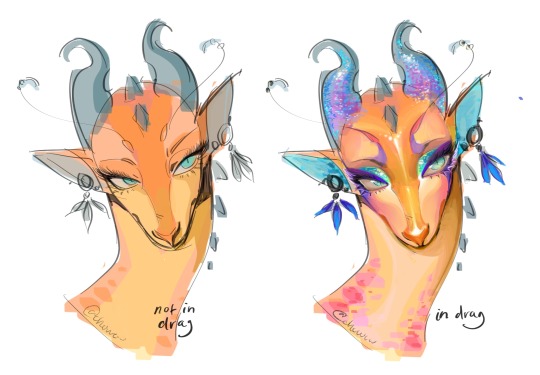
The (Drag) Queens of Pantala
In order to properly explore Pantalan drag, I first looked to the (cultural) definition of drag itself, as well as learning some brief history. With the first known preformance occurring in 1867 (Although not truly popularized until the 19th century,) Human Rights Campaign and other LGBTQ+ organizations describe drag as a preformance art form that uses costumes, makeup and other tools to illustrate exaggerated expressions of gender identity, intended to critique gender inequality or other social justice issues. Drag has traditionally been preformed/pioneered by members of the LGBTQ+ community, predominantly gay men and/or people of color.
With this in mind, Pantalan drag was most likely created and developed by Silkwings (especially in jewel hive) as a form of protest art. I imagine the movement was later popularized by hivewing audiences, becoming more palatable to the wider public after being endorsed by a privileged group as art movements often are. While there are a myriad of social justice issues Pantalan drag could have originally meant to critique, the loss of Silkwing rights and deforestation of Pantala were probably the two main driving topics.
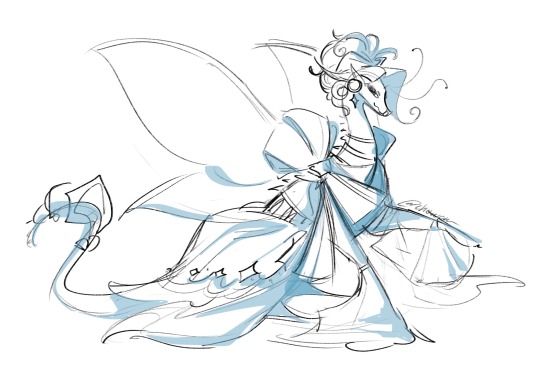
Their Artistic Process
As for the actual production of drag costumes or makeup, Silkwings would have had to work with what was available to them - fruits, vegetables, basic dyes/craft materials and their own silk. They would construct their own jewelry using beads instead of gold, weave their garments, and grind mica with pigments and oil to make eyeshadow.
Leaves, roots and trees would be frequent design elements of early drag: with the eye-catching glamour of a dragon working to simultaneously distract detractors and seek out supporters. Heavy accessorizing and imagery of wealth would also be important to presenting Silkwings as equal to Hivewings, through metaphorical sense. The processes of creating Pantalan drag is what leads me to believe it would prosper best in jewel hive: outside of their relaxed rules and support of Silk/Hive equality, they would also have easiest access to craft materials, dyes and a lively art scene.. endorsed by Lady Jewel herself.
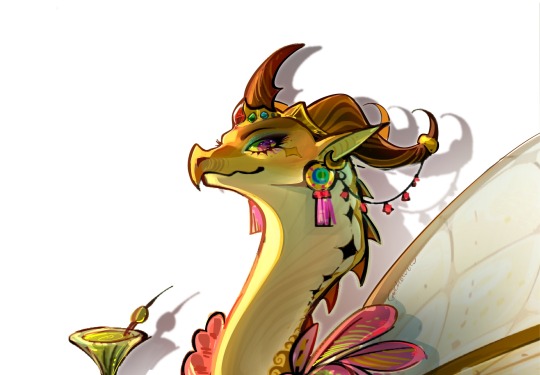
Just a few thoughts on drag. Thanks for asking this question! I was looking for a chance to spill and you gave it to me ( ´ ▽ ` ).。o♡
#wings of fire#wof#art#character design#wof redesign#hivewing#hivewing wof#wof hivewing#wof silkwing#silkwing wof#silkwing
1K notes
·
View notes
Text
Throwback
Male Triceratops Hybrid Alpha Yandere x Gender Neutral Capybara Hybrid Omega Reader
CW: Noncon, painful to pleasureable sex, mild violence (not towards reader), time travel, sexism, breeding, impregnation, pheromones, a/b/o, musk, scent marking, scent kink, sucking on dem big man titters, biting, bite marking, claiming, exceptionally huge dick, reader inflated with copious cum, knotting
Word Count: 1.9k
(Sometimes I get stuck on WIPs and have to do something new to write again. I wrote this in two days. Hope y'all like it! Please feed me with comments ❤️)
You were an omega demi-human. Part capybara, though the only evidence of this was your soft ears. More importantly, you were a quantum physicist. Currently, you were studying and recreating what you thought to be a time travel device. Your thoughts and theories had been dismissed entirely by your peers. It didn't help at all that you were an omega. Omegas working in academia were almost universally harassed, derided, and treated with condescension. As if their omega brains couldn't work at the same level as betas and alphas.
But even if it wasn't some type of device for traveling through time it was certainly alien to the time period from which it originated. It was made of advanced alloys and components that had been flattened, buried, and heavily corroded over time. The rock in which it was embedded in was older than any ancient society.
You had been working on manufacturing a functional copy of the artifact for years. Shmoozing up eccentric rich fucks, getting help from the exceedingly few colleagues who would help you in any way, slowly analyzing every detail and carefully bringing it all together. And at long last it was complete. The zenith of your career was at hand. And after some cautious testing that you conducted privately, it was ready to show to others.
You managed to get a spot at a small conference, though you had lied about the subject on which you would be speaking, and by the time it was your turn most of the audience had left. Not many academics cared what an omega had to say. Let alone one with a reputation for being a crackpot. But there were still enough of your fellow scientists and this would all be on video.
Instead of introducing the topic of your presentation, which would be a surefire way to lose what people were still watching, you opted for wheeling out your machine onto the stage and stepping in. With a deep breath, you booted it up and the entire contraption disappeared with a flash.
When you exited the machine there was an immediate problem. You stepped out of the machine into a forest with giant trees and flowers. You had only intended to go back a minute to when your presentation started but had made an error. You turned around to step back in but something pulled you backwards by your rear. You fell back and saw before you a humongous man charging at your time machine. He wore only a ragged fur loincloth and swung a massive club. He looked human except for his size, thick tail, scaled arms, and three horns on his head. One large horn from each temple and a small one extending from my nose.
You looked on in horror as he swung a mighty club down upon your only way back to your own time, repeatedly smashing it down until it resembled the exact shape of the artifact that had been excavated in your time. The relic that you had fashioned your own machine after. That wasn't what your attention was on, however. You were much more focused on getting away from the raging beast of a man who could flatten metal so easily.
Though with his task of destroying the frightening affront to nature that had appeared from nowhere now complete, he turned his attention to you. He shouted at you in a language you didn't understand, though his intent was clear. He had a massive erection sticking out from his loincloth and aggressively sniffing at your neck after picking you up with unexpected care.
With exertion of great willpower, the trike-man managed to not breed you silly right there in the forest. Your pheromones were driving him nearly feral. Modern-day omega pheromones were many times more potent than any prehistoric omega. They had evolved through millennia to pique the interest of choosy alphas despite the steep competition, an evolutionary arms race to try to snag an alpha.
That wasn't the only appealing trait. You were exotic, had cute little furry ears on your head, and you were so small, couldn't fight back and act all defiant like the omegas from his time.
You did struggle though. You had seen his arousal and could still smell it. Almost anything would be better than being violated in such a manner by such a hulking brute. He chuckled at your struggles, they were successful only in tiring you out. On the long way to his lair, between your squirming, kicking, and punching, you had gathered that his name was Orryg. At least you thought it was. He did not speak English, but he gestured at himself and seemed to be trying to give you his name.
He found your struggles kinda cute, mistaking them for an eagerness to escape his grasp and get on with taking his cock already. Omegas were so silly.
"Don't worry. Going to breed you plenty. Better in a secluded place."
You had no idea what he said, but his voice was deep and sounded angry so you could only assume it was something in annoyance at your struggles so you went limp. The giant man could snap you like a twig if he wanted to, best not to make him too upset. And honestly, even if you did escape, where the fuck would you go? What if Orryg wasn't the worst thing prowling about in the time period?
The walk went on for a while, with Orryg giving you an occasional lick or mumbling out some words you didn't have any hope of understanding. After a fair amount of time, Orryg stopped to sniff the air. Suddenly there was a roar from behind.
Orryg turned the two of you around just in time for him to take his club and smack it into a man who was every bit as huge as he was. Swatting him away easily despite being similar in size and build.
This one had sharp teeth and clawed fingers. He spat blood and growled. Orryg regarded him with a scowl.
"Udvik! You know this is trike territory!!"
"Omega smells good, not claimed yet. Thought I'd try..."
"Go before I smash you! This is MINE!"
Udvik spat again and hobbled off. But your suspicions had been confirmed, there were definitely things other than Orryg to be worried about in this time period. You were pretty shaken up seeing a half-dino man jumping at you and watching your captor fight him off. With those teeth it had clearly been no herbivore, it probably would have slaughtered you. Your fear must have been evident in your scent because Orryg held you tighter and nuzzled you.
"That battle got my blood flowing, really need to fuck you. Sorry if it scared you, I'll breed you all better. Almost home."
You continued to have zero idea what the hell he was saying. But you figured with the nuzzling it was something comforting. Though your ability to figure anything out was pretty absent by this point. Your brain was soup. All the anxiety and adrenaline and alpha pheromones had finally gotten to you. You looked at the ground in a stupor as he continued to carry you over his shoulder.
The next thing you were consciously aware of was him entering the cave with you and placing his club at the entrance. He laid down on a slab of stone covered in thick layers of soft furs and placed you on top of his muscled body. Before you had any chance to react he began administering attention to your sensitive neck. You squirmed involuntarily, writhing in pleasure on top of him from the neck stimulation alone.
If that wasn't enough, you were practically drowning in his musk. You had been since you entered his dwelling, the cave was saturated in it, but now he was forcing your head under his arm and making you drink it all in. Smearing your face with it and marking you with his smell. Slick was leaking out of your needy hole and pooling on his abs.
"I knew this would make you feel better."
The trance you were in was only partially broken once you felt the blunt head of his much too-large member press against your hole.
"W-wait! I don-"
But he had no idea what you were saying, and even if he did he knew you'd love his dick so much that you wouldn't protest for long. At this point, you were going to be his... no matter what.
You yelped in pain as he pressed into you, spreading you like none of your toys ever had. He swallowed your shout by pressing his mouth into yours, trying to distract you from the pain with a sloppy kiss before attending to your neck again. Despite every instinct telling him to just ram in and ravage you he restrained himself knowing that doing otherwise could seriously injure you.
"Ah!"
Even with his care it still hurt as he slowly eased his prick all the way into you, he rubbed the outline of his cock through your tummy. Lucky for you omegas were extremely stretchy and pliant.
Orryg slowly thrust back and forth inside you as he hungrily took in your scent. As more precum dribbled into you and mixed with your slick you took him easier and the pain slowly began to ebb away and was eventually replaced almost entirely by pleasure. You moaned softly into his chest as you bit at his pec and sucked his nipple while he kept digging his cock into you.
Your whole body shook and spasmed for a solid minute as you came more intensely than you ever had before. Orryg grunted as the feeling of your body convulsing around him brought him nearly to his climax. The trike man upped the pace just a bit, his heavy balls smacking into you before he started knotting inside you and pumping you full of his virile spunk. One small mercy was that his knot was only a bit thicker than the rest of his cock, not over two times as wide like a modern alpha.
The volume of semen was such that it made you look heavy with child, which you certainly would be after lovemaking like this.
Now that you had been well and truly fucked there was only one thing left for your brand new "husband" to do to really seal the deal. He, with great caution, buried his fangs into your neck to mark you permanently as his to everyone who might see you. Which would be more than you might expect. This was Orryg's outpost, he stayed there while on patrol, but he usually lived with his herd.
It would be a hard adjustment for you to make. You would constantly be under Orryg's watchful gaze or the guard of his tribemates when he went to go hunt or if he went to do things too dangerous for you to be with him. You'd never be alone. Even in the safety of the herd, Orryg would obsessively treat you like something fragile. You would have to adjust your diet to what they ate, mostly fruit and vegetables though they ate meat too, though nothing was familiar to you. You would have to slowly learn their language so you could eventually communicate with the new society that "adopted" you.
But it was okay if it took you a while to get settled, you had all the time in the world.
#yandere teratophilia#yandere terato#yandere x reader#monster boyfriend#my ocs#gender neutral reader#yandere monster#yandere boyfriend#male yandere x gn reader#My OC Orryg
2K notes
·
View notes
Text
"Tintin, quel âge as-tu ?"
Today marks 96 years of The Adventures of Tintin, and readers have spent at least the last 78 of those years asking the same question: "How old is Tintin?"
The series is infamously coy about giving a definite answer, as was its creator, but I argue in the first part of this post that 1) there was indeed a specific intended age range for Tintin and 2) it is very much possible, using evidence from many different sources including the albums themselves, Tintin magazine, other BDs of the time, and interviews with Hergé, to say exactly what that age range was. Let me be very clear: I'm specifically making an argument about how old Hergé saw him as and how old Hergé wanted him to be seen as.
The second part is less concrete; it presents how a few scholars have interpreted the ambiguity of Tintin's age, plus some of my own thoughts about it that build on their claims. That part is less trying to find an answer to the age question and more trying to explain why his age is so much in question.
This is a long post.
I. Intent
Official sources
When asked about Tintin's age in a 1960 interview for Cinq colonnes à la une, Hergé judged that "il doit rester aux environs de quinze ans" ("he must still be around 15 years old," 0:33-0:44).
In 1962, he gave a very similar response on the Canadian program Premier Plan: "Une quinzaine d'années ? Quinze ans, seize ans, je ne sais pas, moi" ("About 15? 15, 16, I don't know"). "Donc c'est l'adolescent" ("So he's a teenager"), pursues the interviewer, and Hergé answers with a firm yes.
Nearly ten years later, in 1970, he added some nuance: "What age do I give him? I don't know... 17? In my mind, he was about 14 or 15 when I created him, a Boy Scout, and he practically hasn't budged. Let's say that he's picked up three or four years in forty years... All right, let's take the average: 15 plus 4, 19." (translation mine)
In 1979, his interviewer on Apostrophes preempted him on the age question, saying that "c'est un reporter de quinze ans" ("he's a 15-year-old reporter"). Hergé agreed: "C'est ça, à peu près" ("That's right, more or less").
Today, the official Tintin website run by Moulinsart declares him to be "Seize, dix-sept ans (dix-huit tout au plus !)," that is, "16, 17 years old (18 at most!)."
Responses to reader questions in the Journal Tintin
Early in the Journal Tintin's run, between 1946 and 1954, readers who wrote in with questions had a chance to see the responses to their letters published in the magazine each week. Supposedly it would be Tintin himself who was answering - questions addressed to him would be answered in first person, which probably only increased the urge to ask about personal details. So there were naturally many questions about his age, which provoked a range of responses.
Who was actually answering the letters? It's hard to say. But seeing as the responses were being published in the official Tintin Magazine as the voice of Tintin himself, Hergé would surely have been at least consulted on questions concerning his character, especially as the team running the magazine was still very small when it was regularly publishing responses.
The most common response was to dodge the question entirely. The stock phrases were "Qu'importe mon âge ?" and "Tintin n'a pas d'âge !" ("What does my age matter?" "Tintin has no age!").
In a small number of cases they related Tintin's age to that of his readers; an 11 1/2 year old was told that Tintin can be "l'âge que tu souhaites : entre dix et vingt ans !" ("whatever age you want: between 10 and 20!", 1953), and for a couple others, where the age of the writer wasn't listed, Tintin's age is "un peu plus que le tien" ("a little older than you," 1951) or "un peu moins que le double du tien" ("a little less than twice your age," 1950). The target audience of the Journal Tintin - as it was for the Petit Vingtième, and for comics magazines of the time generally - was 8-15 year olds.
The only definite answer that appeared with regularity put Tintin's age between 15 and 20:





(TIntin nos. 19, May 8, 1947; 26, June 26, 1947; 6, February 5, 1948; 2, January 12, 1950; 9, February 27, 1947. The second and third examples also have Tintin declare that "I've travelled so much that I no longer remember where I was born," a fine example of the de-Belgicanization he underwent after the early years.)
("As I've already told several of my friends, I'm older than 15 but younger than 20." (1947) "My age? Let's say 15… or a little older." (1947) "My age? Between 15 and 20 years old." (1948) "Tintin? He has no age! Seeing him move about, he seems to be about 15." (1950) "I'm not yet 20 but I'm older than 15." (1947))
Real-life incarnations of Tintin
When the end of Soviets was celebrated with "Tintin" arriving at the Gare du Nord in Brussels, the role was played by 15-year-old Lucien Pepermans. When the event was repeated for the end of Congo, two years later, Pepermans was replaced by Henri Dendoncker, age 14. About thirty years after that, Jean-Pierre Talbot was declared Tintin's spitting image at 16 ("Same age, same silhouette, same face, same hair," reads the announcement of his casting in the Journal Tintin). He was 20 at most when Blue Oranges (released 1964) was filmed. Hergé told Numa Sadoul that he unconsciously based Tintin in Soviets on his younger brother Paul, who was 16 when it started. Additionally, Palle Huld, often cited as an inspiration for Tintin, completed a tour of the world in 44 days in 1928 at age 15 (and in plus-fours).




(Lucien Pepermans, Henri Dendoncker, Jean-Pierre Talbot, Palle Huld)
In the play Tintin et le mystère du diamant bleu (1941), which Hergé was very involved in the writing and production of, the role of Tintin was played by Mlle. Jeanne Rubens, a woman - a common theater trick for portraying young boys. He was played by a woman again in Radio Luxembourg's 1950s audio adaptations: Claude Vincent, "qui interprétait à merveille les rôles d’enfants et d’adolescents" ("who played children's and adolescents' roles wonderfully"), was the voice of Tintin. Sadly those broadcasts appear to be lost, but she can still be heard in the likely similar role of Alix.

(Shared on forum-tintinophile.com, "Tintin aux Indes, ou le mystère du diamant bleu." Certainly the only adaptation that got his height difference with the Thompsons right.)
In 1959, the Journal Tintin invited readers who thought they looked like Tintin to send in their pictures; five candidates for "Tintin's lookalike" were chosen by the magazine and presented to the readers for them to vote on. The winner was a 15-year-old, and while the ages of the other contestants aren't listed, they appear to be the same age or younger.


(Tintin nos. 25, June 24, 1959 & 31, August 5, 1959)
Comparisons with contemporary characters
Mainstream BD in the first half of the 20th century was not particularly inventive, especially as it was contending with its relative youth as a medium, a focus on the children's market, and, especially after WWII, heavy scrutiny from both religious and secular moral watchdogs. In the specific case of the Journal Tintin, Hergé's iron-fisted artistic direction in the early years led to a high level of artistic homogeneity across the magazine, while restrictions on the types of stories that could be told (from both the threat of censors and expectations about reader interests) limited variety in plots, characters, and settings.
All that is to say that a lot of what was being published alongside Tintin in the 40s and 50s looked more or less like Tintin, and even was likely directly modeled on it, which makes it useful for comparison. The protagonists of the time can be generally divided by age into children, the "15-20" range, young men, and middle-aged men. Each category is visually distinct (comics are a visual medium!) and each results in a slightly different kind of story with different character dynamics.
Here's Tintin with a couple of the teenage protagonists that appeared alongside him in his magazine:



(L'Affaire Tournesol (1956), p. 51; La Griffe Noire, Tintin no. 6, February 5, 1958; Les Deux Visages de Kid Ordinn, Tintin no. 1, January 2, 1957)
Hergé's no. 2 collaborator Jacques Martin created Alix (center, 1948), a Roman Gaul confirmed to be 16 in the original albums. Chick Bill (right, 1955), who in looks and narrative role is effectively just Tintin as a cowboy, is identified (by none other than Franquin) with the 15-20 age range. Some shared visual markers of their youth are a short and slight build, rounded shoulders, a round head, and a soft jawline. While all very independent, they are all three semi-accompanied by a much older man and a child sidekick.
Now, here are some examples of characters from the next age range up:



(L'énigmatique Monsieur Barelli, Tintin no. 44, November 2, 1950; L'ouragan de feu, Tintin (Kuifje) no. 37, September 15, 1960; Défi à Ric Hochet, Tintin (Kuifje) no. 8, February 25, 1964)
Hergé's no. 1 collaborator Bob de Moor had a humor-adventure series using the same style as Hergé, but his character, stage actor Georges Barelli (left, 1950), is a grown man. Martin's second series was required by publishers to somehow be a modern AU of Alix, but Alix's counterpart, reporter in the same way that Tintin is a reporter Guy Lefranc (center, 1952), is clearly older than him. So-called reporter, really amateur detective Ric Hochet (yes, that's his name, right, 1955) is kind of an odd case; he started out a child, then looked basically exactly like Chick Bill (they were both drawn by the same artist, Tibet), then finally settled into his final form as a young man in his mid-twenties - a 1969 album places him at age 26. All three own their own cars (admittedly a moot point for Alix and Chick), and, compared to their teenage counterparts, they're much more likely to have friends and colleagues their own age instead of being supervised by someone older.
It should be clear from these six pictures that Tintin was not drawn in a way meant to make readers think he was an adult. And besides, there's really no reason to believe that Hergé, who once declared that "my primary objective is to be legible. The rest follows," would have chosen to give his main and titular character an appearance that was somehow deceptive. I'm prepared to say with confidence that Tintin looks young because he's supposed to be seen as young.
Textual evidence
For this section, I first look at a few ways that the albums actively present Tintin as a non-adult character. However, most of what follows is about showing that what happens in the albums does not contradict the argument that Tintin is intended to be a teenager. The Adventures of Tintin may be deceptively timeless, but not only is the series nearly a century old, it also was written during a time of extremely rapid and intense social, cultural, and technological change. Consequently, I want to make sure that I'm not judging the past with the attitudes of the present; in order to put the series in its proper context, I try to identify viewpoints and conventions expressed in texts created at the same time (and, when possible, by the same author) to see if a teenaged Tintin fits in with them.
In looking over how other characters refer to him across the albums, one sees that Tintin's most distinctive feature to those around him is his youth. This is, I think, more visible in the original French, where other characters address or describe him with a whole array of words commonly used for children: jeune homme, (jeune) garçon, gamin, galopin, blanc-bec, enfant de choeur, fiston, freluquet, moussaillon, (mon) petit (used as a noun), and morveux, not to mention many, many instances of characters appending "jeune" or "petit" to another word ("reporter," for instance). In English, he's variously (a) young man, (young) boy, kid, boyo, whippersnapper, wonderboy, lad, brat, puppy, young fellow-me-lad, and cabin-boy, along with liberal use of the corresponding adjectives "young" and "little." (I've collected specific panel examples for reference in another post.)
As @professorcalculusstanaccount has pointed out, there's no question of Tintin being called up for the draft as Haddock is in Black Gold; that album also contains the only example of Tintin's competency being questioned because of his age, on page 7: "So you're the new radio officer... You look a bit young to me..." (There's one similar remark, in America, after Tintin is injured in a car accident on page 6: "The poor kid..." "He looks so young...") Him not being called to war is particularly striking because Belgium historically required young men to do compulsory military service at age 18 or 19, after which they would be enrolled in the reserve army (p. 274). Thanks to a hard-to-translate joke in the original French for Emerald (below), we know that military service exists in Tintin's world and that the Thompsons have done theirs; Hergé did his at age 19, and then was called up from the reserves in 1939, interrupting the magazine publication of, precisely, Black Gold. Given his longtime anti-war stance and the peace sign sticker he wears in Picaros, though, one can easily imagine Tintin becoming a conscientious objector after it was legalized in 1964 - but by 1964, most of the series was already over.

(Les Bijoux de la Castafiore, p. 37)
He also doesn't dress like an adult: the plus-fours look very childish after the 1930s, as @illegally-blind-and-deaf pointed out. He also never wears a proper hat, only a flat cap in a few early adventures, and from Temple on (that is, after 1948) he runs around in his shirt and sweater with no tie or jacket. Some of that can be put down to the importance Hergé placed on his characters being maximally recognizable, but it certainly doesn't make Tintin look any older - look at a few of Hergé's crowd scenes and compare how the background characters are dressed.
Next, he doesn't seem to ever need to shave. In fact, in the original French for Black Island, Tintin remarks that the bad guys have gotten away "à mon nez et à ma barbe," an expression equivalent in English to "right under my nose" but literally "at my nose and at my beard," to which Snowy incredulously responds "Your beard? What beard?"

(L'Île Noire, p. 29)
It's true that nearly everyone who meets Tintin, including his adult friends, addresses him respectfully with the formal pronoun "vous" instead of with the informal "tu," as you typically would for someone much younger than you. However, Pierre Assouline attributes this to a dislike of over-familiarity on Hergé's part, citing him as saying that "Le tutoiement est la fausse monnaie de l'amitié" ("Using 'tu' is the counterfeit money of friendship").
(There are a few moments where Haddock slips and uses tu with Tintin, but I won't go into them here. Suffice to say that the majority of them are indeed moments where he's treating Tintin more as a child.)
Much has been made of Tintin's nonchalance about drinking alcohol as proof of adulthood, but evidence from other BDs indicates that this perception is a result of a shift away from historically looser attitudes towards drinking. Early comics for children frequently carried moralizing messages, but there's no marked moralizing present around youths drinking like there is around them smoking.
Compare, for example, the difference in tone between these two Quick & Flupke pages, where the kids are sternly warned off from tobacco...


(Originally published in Le Petit Vingtième nos. 4, January 28, 1932 & 43, October 24, 1935)
...Versus this gag, where Flupke's own relatives getting him drunk on New Year's over his protests is played entirely for humor.


(Le Petit Vingtième no. 1, January 3, 1935. "Tu es un homme et tu dois boire!")
There was even a follow-up comic at the same time the year after, in which Flupke imagines the alcohol he'll be plied with on January 1st and attempts to move to the North Pole to avoid it.
If a kid as young as Flupke is being given alcohol, then Tintin really doesn't have to be much older to be drinking as well. In fact, one might even note an echo between Flupke's reluctance to drink here and Tintin's in Picaros, when he's pressured to take a swig of whisky by Arumbaya custom (p. 34). On the other hand, since Quick and Flupke are so young, the ban on smoking is stronger for them. Tintin is old enough to occasionally be offered a cigarette, but still young enough that he always must refuse: Hergé was adamant that Tintin remain a good model because of the children who identified with him, while Haddock smoking his pipe, for example, never raised the same issue.
Beyond that, for a non-Hergé example and a later one (from 1960), here's child tennis prodigy Jari, hero of an eponymous strip in the Journal Tintin. He's just bicycled from Belgium to the Netherlands and wants a refreshment, so he goes to a drink stand and orders a beer - and no one bats an eye. Similarly, the only alcohol that Tintin orders casually, in a cafe or pub, is beer (Golden Claws p. 2, Black Island p. 41).

(Jari et le Plan Z, Tintin (Kuifje) no. 40, October 6, 1960)
At the same time, this relaxed attitude has limits. Tintin won't share a friendly drink with Haddock, for example when returning to Marlinspike after an excursion (though Haddock pours two glasses anyway in Affair (p. 3)). Calculus scolds Haddock severely when he thinks that Haddock has given Tintin champagne at breakfast in Tibet (p. 4: "Vous avez bien tort de lui faire boire du champagne de grand matin, à ce garçon !…"). Later in that same album, Haddock drunkenly warns Tintin against alcohol, telling him it's "very bad for young people like you!" (p. 38).
Next, while Tintin is undeniably capable of driving a car, there's actually no indication outside of the earliest stories that he can legally drive. (A quick Google search also tells me that Belgium has historically been notoriously lax on road safety.) At no point after the first four albums - that is, after Hergé became interested in telling a story that makes logical sense, a development typically placed at Blue Lotus - does Tintin drive a car that was acquired legally, not commandeered or outright stolen. (In Soviets and Congo he buys a car; in Cigars he drives the two Rajaijah victims to the asylum, though I doubt anyone was worried about him getting pulled over in the jungle.) On the few occasions where there isn't an emergency, it's always Haddock who drives; see for example Crystal Balls or the few pages of Thérmozéro. When Tintin finally gets a vehicle of his own, in Picaros, it's... a motorbike, which one can get a license for at a younger age than for a car. And in Alph-Art, where the motorbike plays a much larger role, Haddock still drives Tintin into town (p. 25) - and then gets left in the car while Tintin investigates!
Hergé also apparently didn't think flying a plane was particularly difficult. In Jo et Zette, one of his other series, Hergé has little Jo be able to fly his father's "Stratonef" and even land it from a glide, despite only ever hearing his father talk about how to fly it. Over the course of the two-part story (Le Testament de M. Pump and Destination New-York), Jo manages multiple successful flights - more than Tintin ever does! - despite unambiguously being a child.

(Destination New-York, p. 41)
And as with the cars, every plane Tintin ever flies is stolen, so whether he has a legal license or not really doesn't matter.
The same goes for his guns. In all but the first albums and Ear where, surprised in his flat, he really does pull a revolver out of nowhere, Tintin's guns are explicitly either given to him or taken from a disarmed enemy. The series doesn't make a point of him owning and carrying his own gun - just the opposite. And while it seems to us now that Tintin has a lot of firearm use for a children's comic, proficiency with guns was honestly a genre expectation for all adventure heroes of the time (just don't put a gun on your cover). For example, Chang, who from his introduction on acts like a second Tintin, wields a pistol at the end of Lotus and is even implied to be the one who makes the shot that breaks Didi's sword despite appearing even younger than Tintin. (See also the previous section of this post; Chick Bill is carrying a gun in the picture I included.) What's more, the gunplay in Tintin is actually a step down from its predecessor Totor, where Hergé's titular Boy Scout kills a man with a rifle shot to the face.
In short, Tintin is able to do a lot of things he shouldn't legally be able to do by simply not doing them legally.
The fact that Tintin lives alone isn't necessarily a mark of maturity either. It's hardly uncommon for a young adventure protagonist to be unusually unsupervised; it's effectively a demand of the genre. Hergé learned why that is from experience when he created Jo et Zette for the editor of the French, ultra-Catholic children's magazine Coeurs Vaillants, who had raised concerns about how unrealistic Tintin was. In Hergé's own (translated) words:


(From Entretiens avec Hergé, reproduced & translated in The Comics Journal no. 250, p. 191)
Parents are a nuisance, one that Hergé was only too happy to dispense with in Tintin's case. And besides, Tintin isn't completely alone forever; with the introduction of the Marlinspike "family," not to mention Marlinspike Hall itself, during the war, he at least ends up with a home and some adult supervision, however dubious it may be at times.
As for his schooling, according to a report on the Belgian education system from 1932, education was only compulsory there (not to mention free) from ages 6 to 14. That same report records that in 1928, the number of students in the higher level of secondary education - corresponding to high school in American terms - was only 1% of the number of students enrolled in compulsory primary school. Even adjusting for the fact that primary education enrolls children for twice as long, the percentage is still a paltry 2.6%. And then the number of students in university that same year was only about three-quarters of the number of students in secondary education.
What that means is that at the time when Tintin was getting started, only very, very few people stayed in school beyond age 14. Hergé himself was one of those few, but to many of his readers in the early years, the idea that Tintin was already working at age 14 or 15 would have been not just reasonable but recognizable - especially as he has no apparent family to support him. (Not that Tintin isn't knowledgeable: judging from the number of books in his apartment, we can presume that he's quite the autodidact.) Of course public education was broadened after WWII, but by then the character was already firmly established.
As for how Tintin is already a reporter, well, Hergé freely admitted that he gave him the job just because that's what he thought was cool at the time. "Of course it was a pretext," he said on British radio in 1977. (The announcer for that interview describes Tintin as "a 16-year-old Belgian boy with a strange lick of hair, a pair of plus-fours, and a terrier." In it Hergé, questioned about the outsize success of his series, responds that for him "he [Tintin] keeps to be a little boy. Only that.") The tone of the series would be very different if Tintin were just an office clerk or a paperboy, after all - and besides, all but the youngest readers of Le Petit Vingtième would have understood that it's not a real newspaper, just a little children's magazine, so the idea of it having its own official reporter was not to be taken fully seriously.
It's important to remember that our current cultural idea of the teenager as a separate, unique stage between childhood and adulthood was largely a post-WWII American innovation - in fact, the word "teenager" only entered popular use in the 1940s. By contrast, fully half of the Adventures of Tintin (up to the first 2/3 of Crystal Balls) were written either before or during WWII. Hergé himself, born in 1907, began submitting illustrations to a magazine (Le Boy-Scout) at 14, was hired at the Vingtième Siècle at 18, created Totor and did his military service, reaching the rank of sergeant, at 19, and before turning 22 had been given full responsibility for creating and running the Petit Vingtième, gotten engaged to his first wife, Germaine Kieckens, and created Tintin. Being young looked different then.
To close this section I'll also note that, as far as I can tell, positioning Tintin as a teenager never seemed to pose much of a problem to anyone reading the series while it was actively running. Anecdotally, nearly every published source I've read takes for granted that he's an adolescent, and an exception like writer of multiple books on Tintin Renaud Nattiez saying on the air in 2016 that he thinks Tintin is at least 22 (~03:30-03:50) seems to be a uniquely 21st-century development.
TL;DR: Everything I can find indicates that Tintin was always intended to be around 15, and never older than 20, years old.
II. Interpretation
Finally, it's important to not overstate Hergé's commitment to realism. At the end of the day, Tintin can do whatever the story needs him to be able to do, because he's the protagonist of a very straightforward adventure serial. He's always been aspirational, even for Hergé himself: "Tintin is me the way I'd like to be: heroic, flawless." And yet Tintin, victim of its own success, has always been held to a higher standard of realism than its fellow comics, not to mention a higher level of scrutiny in general. Even if, as I've tried to demonstrate, Tintin's feats aren't entirely out of the range of possibility (or at least the norm for comics characters) for his time period, I'm not arguing that he's supposed to be a perfectly accurate representation of the average boy of any point in the mid-20th century. I also don't deny that he typically does act like an adult. So the guiding question here is: How can this dual nature of Tintin's - his adolescent status and adult aspects - be interpreted?
Jean-Marie Apostolidès writes that as "il unifie dans sa personne deux aspects opposés de l’existence, l’enfance et l’âge adulte" ("he brings together in his person two opposing aspects of existence, childhood and adulthood"), Tintin represents "un mythe réconciliatoire" ("a reconciliatory myth") of which the "fonction implicite est de ressouder entre deux générations une confiance brisée" ("implicit function is to mend a broken trust between two generations"). He names this type of child-adult character the "surenfant" ("superchild"), and argues that it is specific to the 20th century and the cultural shock of WWI.
For Pol Vandromme, who wrote the first book of analysis on Tintin (or on any BD), Tintin is simply a perfected version of the teenage boy, one that other teenage boys can aspire to. First, he cites as conventional wisdom that Tintin is around 15, and concludes that "c'est dans tous les cas un adolescent" ("in any case he's a teenager"). While Vandromme accepts that Tintin is presented as a teenager, he also points out that Tintin doesn't represent the experience of being a teenager; Tintin "ne présente [...] que les apparences de l'adolescence" ("only displays the appearance of adolescence") because he's so self-assured and stable, traits antithetical to "l'époque de la métamorphose" ("the time of metamorphosis") that is adolescence.
And yet "il [Tintin] demure malgré tout suffisamment proche pour que les garçons se disent qu'ils auront un jour la chance de lui ressembler, d'imiter son style de vie. [...] Ce que Tintin propose à ces garçons de quinze ans, c'est la figure achevée de leur âge. Il les venge de leurs insuffisances" ("he [Tintin] remains all the same close [i.e. similar] enough that these boys tell themselves that one day they'll have the chance to be like him, to imitate his way of life. [...] What Tintin offers to these 15-year-old boys is the perfected version of their age [group]. He makes up for their shortcomings"). Consequently, having put themselves in Tintin's place, these boys "ont l'illusion d'être déjà de la tribu des jeunes gens qui ont découvert dans leur sac de voyage les clefs qui ouvrent les portes de la fable du monde" ("have the illusion of already being part of the clan of young people who have discovered in their travel bag the keys that open the doors of the world's fable"). In plainer language, being able to identify with Tintin as an apparent peer lets teens imagine themselves as being more capable and powerful than their age allows in reality, an attractive illusion.
I'll add that the static quality of Tintin as a character that Vandromme identifies is dictated by the form of the series. When presented with a teenage protagonist in a work, the novelistic expectation is that what follows will be some kind of bildungsroman, where the events of the story will push the protagonist to change and mature into adulthood. However, I believe that it's a mistake to approach The Adventures of Tintin as a novel when it is fundamentally a serial - even late in his career, when he didn't need to do prepublication anymore, Hergé's approach to plot was still oriented around the page-a-week format. Serial characters, as a rule, change very little. Tintin gets compared to Sherlock Holmes more than once in the series, and it's also true on a meta level: Holmes has a few minor moments of character development, but he largely remains exactly the same over the course of Conan Doyle's stories, which were likewise published in a magazine. In a true serial, the status quo is god, because the main aim of the serial is to perpetuate itself - theoretically forever. And so Watson always finds a reason to return to Baker Street, and Tintin never gets old enough to think of settling down and getting a real job.
Like Holmes, Tintin does change and grow somewhat as a character over the course of the series, but also like Holmes, that growth is not a planned arc with an endpoint, as you would expect in a novel. Instead, it's just a result of Hergé himself maturing and changing. In his contribution to L'archipel Tintin, Benoît Peeters notes that "Grande est la tentation, pour beaucoup, de lire la série comme une totalité, un monument où tout signifierait" ("The temptation is great, for many, to read the series as a totality, a monument where everything has meaning"). And yet he declares that "si accomplies soient-elles... Les Aventures de Tintin se sont élaborées en l'absence de tout grand dessein" ("however polished they may be... The Adventures of Tintin were created in the absence of any grand design"), citing the testimonies of both Hergé and those who knew him at the beginning of the series. Hergé never really had a plan for Tintin as a character; he really did just put him in situations over and over again for a little more than fifty years. However, now that the series is only read in album format and serial publishing is less common, the "temptation" Peeters describes is even stronger. This mismatch in narrative expectations may be part of why modern readers might struggle to view Tintin as a teenaged character.
There's one more element to Tintin's strangeness: the world of the series was built around Tintin himself to facilitate his adventures. Vandromme recalls the fact, so obvious that it's easily forgetten, that "Tintin étant ce qu'il est et ne pouvant être un autre, infléchit l'intrigue d'une certaine manière. [...] Remplacez Tintin par le père Fenouillard et il vous faudra modifier l'album de fond en comble. Dans un roman les personnages déterminent les événements avant d'être déterminés par eux" (Tintin, being who he is and unable to be anyone else, influences the story in a certain way. [...] Replace Tintin with the father of the Fenouillards [character from a 19th-century comic about the misadventures of a French family abroad, n.b.] and you'll have to change the album from top to bottom. In a novel, the characters define the events before the events define them"). This point is especially relevant to Tintin given that the series' beginning was, to put it mildly, haphazard. Starting from Soviets, where Tintin is alone with his dog in a bizarre world where he can sneeze down a sewer grate, cut down a tree with a pocketknife, or fistfight a bear - whatever it takes to keep the plot moving - set a precedent for the character: that Tintin, and nobody else, will always triumph over whatever enemy or obstacle he is faced with.
Because it's founded on Tintin himself, there are no real adults in the Adventures, and in fact there can't be any. Preserving Tintin's Soviets-era boy hero status as the world of the series became steadily larger and more realistic created a kind of 'competency warp' where Tintin, along with his young "doubles," Chang and Zorrino, is effectively always the most capable, the master of the situation, while those closest to him who are much older (the Thompsons, Haddock, Calculus...) tend to act rather childishly. I think it's telling that the 1946 introduction of Blake & Mortimer is often hailed in terms like these: that "pour la première fois, les héros n'étaient pas des enfants, mais des adultes responsables dont la psychologie était en parfaite harmonie avec leurs fonctions" ("for the first time, the heroes were not children, but responsible adults whose psychology was in perfect harmony with their roles," emphasis mine). All the major adult characters in Tintin had been introduced at that point, but apparently none of them qualified as "responsible" or properly suited for their positions.
Apostolidès similarly notes a deforming effect: "Tintin est un adolescent qui, sans jamais entrer dans l’âge adulte, rajeunit le monde en se confrontant à lui. Au lieu que le personnage se soumette passivement au monde adulte, s’intègre dans une histoire, vieillisse et meure, c’est l’univers extérieur qui se fige dans le temps au contact du héros" ("Tintin is an adolescent who, without ever entering adulthood, makes the world younger by confronting it. Instead of the character submitting himself passively to the adult world, fitting in to a history, getting older and dying, it's the outside world that freezes in time at the hero's touch"). Not only does Tintin resist adulthood himself, he also protects others from its effects.
There are characters who escape the warp, but they must stay on the very edges of Tintin's orbit. One example is the efficient and no-nonsense Mr. Baxter from the Moon books. He has a real job: he's director of the atomic center, and every time we see him he's actually doing it. He also remains disengaged from the antics of the Marlinspike crew, often exasperated and confused by them. They don't belong in his serious space program, and he doesn't belong in their funny adventure series - hence the clash. Another (and very different) example is Jolyon Wagg. I wish I could remember where I read it, but I once saw it pointed out that Tintin and Wagg almost completely ignore each other; their only direct interaction in the whole series is saying hello to each other exactly once (Emerald p. 17). The unidentified author's point was that Wagg inhabits a world so intensely banal, so different from Tintin's - one with community organizations, salesman jobs, an old mother, an Uncle Anatole, a wife and (a lot of) children - that the two can't even come into contact. Wagg may be almost preternaturally obnoxious, but he's also a genuinely ordinary man in a way that the major characters really aren't.
Tintin must remain the sole and main driver of action, because if he isn't, the series would have to change fundamentally. That means no other character can threaten his role by being more competent and responsible than him - and so the adults become ridiculous and/or irrelevant, and Chang and Zorrino are only allowed to act for one album each. And yet Hergé created Tintin as a teenager, and suggested that a Tintin who progressed past teenagerhood would also grow out of adventure: "Il est difficile, pour un personnage comme ça, à le faire vieillir. Parce que s'il vieillit, il va avoir vingt ans, il va avoir vingt-deux ans, il va rencontrer une jolie fille, il va se marier, il va avoir des enfants..." ("It's hard to make a character like that get older. Because if he gets older, he'll be 20, he'll be 22, he'll meet a pretty girl, he'll get married, he'll have children..."). Tintin passing into adulthood, 'real' adulthood, symbolized here by settling down and starting a family, would make the series just as unsustainable as demoting him to a more technically age-appropriate role would; both sides of the tension between Tintin's youth and his maturity are required to make him a proper adventure hero for children.
And so he remained, as he remains today, the world's most competent teenager.
#tintin#hergé#journal tintin#le petit vingtième#resources#also featuring:#jean-pierre talbot#quick et flupke#jo et zette#alix#chick bill#monsieur barelli#lefranc#ric hochet#jari
601 notes
·
View notes
Text
Bonds Beyond Words: If Eywa Wills It

PART ONE PART TWO
Pairing: Aged-Up!Neteyam x Fem!Human!Reader
Word Count: 3.1k
Tags: dark themes, indirect mention of r*pe, suicide attempt, eventual NSFW, aged-up! Neteyam, reader has PTSD, Neteyam dislikes humans (except for you), eventual jealous/possessive Neteyam, future Olo'eyktan! Neteyam, interspecies slow burn, angst, fluff, probably OOC, POV’s all over the place, forgive the inconsistencies.
Summary: You, a competent researcher and writer, awoke from cryosleep a year ago, only to be imprisoned by the RDA—they intended to force you and many other women into a selective breeding program to kickstart human repopulation. However, you, the other prisoners, and allied wardens formed an escape plan; it was carried out, but you are the lone survivor.
A/N and Disclaimer: This is my first x reader fic! This is also my first fic on Tumblr in years! I've been reading a lot of ATWOW fics and thought I would write my own. I am also challenging myself to write in present tense (I'm a past tense girly), so please forgive any grammatical errors. Hope you enjoy <3
This story contains explicit content and is only appropriate for audiences 18+. MDNI. Please do not repost my work.

The tracking device beneath your skin feels like a ticking time bomb—although you’re certain it doesn’t have the power to detonate, should the RDA find your location before the prison sector’s power unit comes back online, it could still bring mass destruction to this region of the extrasolar moon. As if the RDA hasn't done enough of that already.
As you walk barefoot through the unfamiliar forest of Pandora, you wonder if this is heaven. Surely, you must have died along the way—you survived the initial jailbreak, then the evasion at dawn, and managed to remain mostly unscathed from the chopper accident. On Earth, you’d feel compelled to buy a lottery ticket. The thought alone makes you chuckle, and your mask fogs in response. Your laughs, albeit quiet, turn maniacal. Maybe you hit your head hastily fleeing the first bunker, or got thwacked by metal shrapnel in the crash.
If you live, the escape will count as a partial success. Living would make you a hero; but as darkness falls on this foreign planet, you silently wish you had become a martyr like the others instead.
You’re completely defenseless. You have nothing more than your respirator mask that won’t stop fogging due to your panicked breaths, and the clothes on your back. You adorn an oversized jacket that you stole from the valiantly deceased helo pilot, and your prison uniform—it’s nothing more than a flimsy, green hospital gown.
You should know more about this place. You were chosen among an elite class of writers to research alien life on Pandora. You loved traveling and writing about new cultures—studying language, customs, and history. It was your pride and joy, your life’s work. Yet, the nightmare started the day you woke from cryosleep and you were forced into a tiny cell with three other women. In your year of imprisonment, two of them had already been selected into the breeding program, while you and the other, Claudia, were awaiting that same fate.
You almost slip on a patch of sludge and break your fall by grabbing a tree stump.
You do know, however, that this hostile environment will kill you if you don’t find the tribe you’re searching for. Certainly, your luck will run out soon.
So, you stop laughing, blink away the tears in your eyes, and regain your focus. You’d slap your own cheeks if you could, but your mask renders the act impossible. You have to survive, or else the girls’ and allied wardens’ deaths will be meaningless.
As you continue on your path, the mud starts to dampen, coating the soles of your feet. You presume this is from a recent rainstorm, or perhaps you’re nearing a water source. You swallow hard—inevitably, you’re thirsty. But if breathing Pandora’s air will kill you, the water will likely do the same.
As you carefully wade through the soppy terrain, you repeat the same phrases under your breath like a prayer or mantra. Even if you suffered amnesia and lost all your memories like a slate wiped clean, you could suffice to lose it all, except a few words which you memorized in Na’vi.
Using these phrases would determine if you lived or died, assuming you weren’t slain with an arrow on sight: after introducing yourself in the language, you must tell them you seek asylum with the Omatikaya clan at High Camp and Max knows you’re coming. Lastly, you needed to say there is a tracking device under my skin, please cut it out.
You recite these phrases again, except this time you mess up the grammatical structure on the last part. You winge, correct yourself, and continue on your course.
The planet begins to dim as time passes. As you avoid tripping over tree roots and crushing delicate flowers, you notice Pandora’s subtle glow. The bioluminescent spots that dot the terrain look like freckles on skin. It’s the first time you’re seeing the real thing up close, instead of in a tiny photograph. You’re as enamored as you are terrified.
Your feet hurt and your shins ache when night fully settles. You’ve been traveling by foot for hours. Imprisonment and preparation for forced motherhood meant there was little opportunity for exercise in the compound. Your body isn’t used to lifting heavy things or globetrotting long distances.
As you use the last of your energy reserves to think—to consider stopping in a safe area for a break—a tremendous force stops you first.
This is it, you think. You know you're going to die.
The force is a Na’vi, whom you cannot see. From their position behind you, an arm wraps around your abdomen, lifting your smaller body off the ground like a doll. The Na’vi lodges their elbow into your stomach, knocking the wind out of you, all so they can wrap their large blue hand around your small, human neck. Despite the panic, you notice how controlled the Na’vi’s grip is—just enough to hold you still without choking you. It feels like a strange paralysis. Your oxygen mask fogs as you pant in distress.
“Why I should not kill you?” The Na’vi asks in broken English. The timbre of the voice leads you to believe this one is male.
Say the thing! your mind reels. You resist the urge to flail your limbs. The slightest movements make the Na’vi tighten his grip—at this very moment, you notice his other hand holds a dagger to your throat. The space between your skin and the blade is miniscule, as is your proximity to certain death.
So you do it, you say the thing. Except, it comes out all wrong:
“My… My name is Asylum at High Camp,” you stammer in Pandora’s native language.
The Na’vi makes a sound of confusion. You won’t know until later, but Neteyam thinks your pronunciation is mechanical, unpleasant, and downright horrible.
Your chest heaves wildly and your heart thrums in your chest like a drum. The realization hits like a truck. “Wait… No, that’s not right,” you say in English. Your jagged breaths aren’t allowing oxygen to circulate in the mask properly—the same goes for your brain.
The Na’vi growls against your ear. You’re running out of time. You gather the last of your composure.
You tell him your name, properly this time, then continue with your monologue. “I-I seek asylum at High Camp, Max knows I’m coming,” you sputter like a dying engine.
The Na’vi makes another sound of confusion, yet still seems dissatisfied. He gently presses the tip of the knife to your throat.
“No! Please!” you beg. Your hands instinctively wrap around his glowing-freckled forearm, but you don’t tug.
The Na’vi freezes. You can’t see it, but something is happening.
Neteyam’s hairless brows furrow when a woodsprite lands on the edge of the blade he inherited from his maternal grandfather. The woodsprite lingers there, teetering on the edge. Then, it slots itself into the small space between your skin and his knife. You can’t help but cringe at the slight tickle of its tendrils against your collarbone.
“Eywa,” Neteyam whispers to himself. His voice is so quiet that you cannot hear.
The woodsprite travels over your clavicle and settles against the skin just below it. The woodsprite glows with vibrance. The light winks at Neteyam. He knows it's a sign. The tip of his knife drags gently against your skin, sending shivers up your spine. The woodsprite flutters away once his knife is over the spot where the tracker sits beneath the surface. His lips part—the area feels hard when he knows it shouldn’t be.
Your eyes widen. You remember your lines, like an amateur actor taking the stage for the first time.
“There’s a tracker!” you shout in English. Your shrill voice catches even Neteyam—the future Olo'eyktan—off guard.
“A tracker?” Neteyam retorts, his voice laced with aggression and uncertainty. He doesn’t recognize that word, but your tone implies grave danger.
You nod. “There is a tracking device under my skin,” you say in the Na’vi’s native tongue. “Please, cut it out!”
Fright flashes upon Neteyam’s face. Mentally, he’s reeling—were you sent here as bait from the sky demons? Is he falling into another one of their traps? Images of the tracker the Sky People lodged into the tulkun’s fin on the reefs of Awa'atlu flood his mind. His heart feels heavy when he thinks of Ro'a and her cub.
Physically, however, Neteyam does as he’s told. He would never willingly take orders from Sky People, but he knows in this instance, it’s the only way to protect himself, his family, and his clan. He must abide by these orders for the greater good.
Neteyam moves swiftly as he pins you against the nearest tree. He holds you there by your neck. Your eyes meet for a brief moment, then he zeros in on the neckline of your hospital gown. He uses his thumb to feel for the tracking device, raises his knife, and cuts.
Pupils blown wide, you study his face in the moment of reprieve before he slashes at your skin. His eyes are bright yellow, like tiny suns or egg yolks. His lips are full, and as he grimaces, he reveals a shiny set of white teeth. His ears point backwards: he’s agitated. His tail swishes from side to side. He wears his hair in braids. Around his neck, he adorns an ornamental choker necklace.
You howl through your teeth. Your jaw is clenched. The pain is unbearable, but at the same time, it’s the best kind you’ve ever felt. Even if this Na’vi should kill you right after, at least in your last moments, you’ll feel free.
Blood pools around his knife as he cuts through the first layer of skin. He tries to ignore your cries as he presses his long fingertips into the open wound. He pulls when he feels a small piece of plastic; with a bit of effort, he dislodges it from your body.
You sigh in relief when the Na’vi removes it, but the pain lingers—it worsens when you press your fingertips against the wound to stop the bleeding. Your eyelids are heavy. You feel lightheaded.
The Na’vi removes his grip from your neck, only so he can destroy the tracker. Neteyam notes that trackers he’s encountered in the past tend to beep, light up, or some combination of both—this one has neither of those attributes. The uncomfortable knots in Neteyam’s stomach begin to untie, but he cannot give up his resolve. His work is unfinished.
He presses the tracker against the tree bark, grunts, and he hacks away with his weapon.
Even as you’re bleeding—potentially to death—you continue to study the Na’vi’s physique and stature. This one in particular is muscular and athletic, and presumably taller than average. The way his muscles move under his blue skin is enchanting, and the way his freckles glow, you might as well be looking up at the night sky. You’re certain this will be your last chance to witness life on Pandora, or life at all—might as well bask in it.
The tracker is chopped and diced into small pieces, like how you used to cut vegetables back on Earth. The Na’vi looks pleased with his work. Then, his hairless brows furrow again, he spits into his hand, and throws the pieces as far as he can into the Pandoran wilderness. He hisses. You think it’s some kind of power move, but you’re not quite sure, and you definitely don’t have the gall to ask.
Neteyam stands still for a moment, bloodied hands on his hips. He has yet to face the elephant in the room—or in this circumstance, the tawtute against the tree.
That blood is only yours. Your eyes roll into the back of your head; you see stars upon realizing just how much you’ve lost.
---
You wake to the sounds of beeps and whirrs.
All is quiet. You’re in a small room with white walls. The lights are dimmed. Your breaths are slow and relaxed—but as the cogs start to turn, you begin to question if you’re safe or not.
Pain shoots through your shoulder like a strike of lightning as you sit up in the cot you’ve been sleeping in. You wince loudly, and the noise echoes.
Your mind briefly recalls the events of the last twenty-four hours, leading up to the encounter with the Na’vi. Evidently, it wasn’t a dream or figment of your highly active imagination.
Your clavicle has been wrapped in a thick bandage. When you pull back the thin blanket that covers the rest of you, you realize the dirt and grime that covered your feet and legs has been washed away.
You sigh in relief. You think you’re safe, until you discover that your old hospital gown has been replaced with a brand new albeit identical one—one with the Resource Development Administration’s logo on the tag.
Your heart feels heavy.
The escape was unsuccessful. The mission failed.
It makes sense now, as your vision swims through the confined space. This must be it—this must be where they took Seraphina, and Leah, and Clover. This must be where the girls who get picked go. Where they are prepared. Where they are taken.
You sit there for a few moments, then begin to hyperventilate. The Na’vi male must have left you there to die, and the RDA must have tracked you down anyway. Given that they lost all of their prisoners in the jailbreak, it made sense. They would do anything to get you back.
You shatter like glass.
Tears prick your bloodshot eyes like thorns. You pluck each wire from your arm like guitar strings, separating yourself from any machines. They continue to beep, but at a different pace, like a sounding alarm.
You search the room for an escape. You spot a pitcher and sponge on the counter adjacent to the bed.
In the laboratory across from the infirmary room, Max looks up from his microscope when he hears a loud crash. He jumps up from his swivel chair and dashes across the hall, opening the infirmary door.
Max has no choice but to undertake—you have a large shard of glass in your hand, and you use all the force in your tired body to resist. He grimaces as you continue to aim for a critical slice on your opposite wrist. His words fail to soothe.
“Norm!” the unfamiliar man calls. “We’ve got a cutter!”
Footsteps thump down the hall, then another man enters. “Holy shit,” he says. “What the hell is going on?!”
“I don’t know!” Max shouts back.
Norm, in his human form, hops over the pile of broken glass, and crouches to meet your bleary, downcast eyes. “Hey… Hey! Stop! You’re safe here!”
You can’t stop the tears from coming. You shake your head and continue to thrash in Max’s arms. “To hell with you RDA fucks!” you spit at him.
Norm’s eyes fall shut when a glob of saliva hits his left cheek. He counts to three before responding. “We’re not with them!” He grabs your wrists. “Calm down! You’re at High Camp!”
You freeze. You choke on a loud sob. “What?” you ask weakly.
“I’m Norm,” the one crouching before you says. “That guy, behind you, he’s Max. We’re scientists allied with the Na’vi. This is the stronghold. You’re in our laboratory.”
You sniffle. The room goes silent. “But this gown?” you croak, showing him the logo.
Norm sighs. “We loot supplies from RDA… That’s all.”
“Take a deep breath,” says Max. You do as you're told, and your muscles relax. Max docks the glass shard from your hand and eases his grip. Norm nods in approval. “One more,” Max adds. Inhale. Exhale. “You’re alright now.”
Inevitably, you start crying again. But this time, your tears are joyous. The tension breaks like ice—it’s melting. You’re awash in relief you thought would never come. It’s euphoric. It’s blissful. You’re free.
A year of suffering and imprisonment is released in your loud sobs. Max catches you before you can fall to your knees on the remnants of the broken pitcher. Neither of them know what to say, so they say nothing.
Norm, the one on the floor, wipes his cheek with the collar of his shirt. Then he reaches into one of the infirmary cabinets, procuring a dust pan and small sweeper. He does his best to clean the porcelain shards quickly and quietly. “Get her an Ativan,” he mumbles to Max on his way to the disposal bin. Max swallows his nerves.
---
You’re moved into another room in the facility after your incident in the infirmary. When you come to, you feel slightly embarrassed. You didn’t even check to see if the door of that room was unlocked, which it was.
“I’m sorry about your pitcher,” you tell Max as he returns from the linen closet with the blankets you asked for.
Max chuckles. He wants to say he’s more than sorry about all that’s happened to you. He was aiding and abetting the lead warden—the one who came up with the masterplan. “Don’t worry about it. That pitcher meant nothing to me,” he assures.
You crack a crooked, uneasy smile. The Ativan is starting to take its effect. Max smiles back.
You feel grateful. The scientists here have been nothing but kind and patient.
You can’t help but also feel grateful to the Na’vi male who presumably saved your life. You don’t know where he is, how to find him, or if you’ll see him again, but you feel indebted. You want to ask Max how you can show your gratitude, but that will have to wait.
“Thank you,” you say. “For everything.”
Max nods with a crestfallen smile. “If you need anything else, I’ll be around in the lab all day. Norm will be spending some time as his Avatar, so he won’t be around until later,” he says. “You were out for two entire days, I’m sure you’re hungry. Feel free to have anything in the walk-in or pantry. We don’t always have meals together as a crew, but tonight we’ll have dinner together,” Max explains.
You’re left alone once Max is sure you’re settled and calm, and won’t break the vase on the coffee table that he does care about.
---
A/N: Feel free to leave any and all feedback on this chapter! Reblogs and likes are greatly appreciate. In part two, Norm and Max will discuss your arrival with our king, Jake Sully. <3
NEXT CHAPTER: PART TWO
#avatar the way of water#avatar 2009#neteyam x reader#neteyam#neteyam x y/n#neteyam x you#neteyam x human reader#self insert#self insert fanfiction#x reader#neteyam sully#neteyam sully x reader#atwow
412 notes
·
View notes
Note
YQY getting hit with truth serum so he has to confess The Secret to SJ is definitely a thing, because jesus fucking christ ANYTHING to make that man talk, but I think the potential for an even larger audience is fantastic.
A scenario like SQQ's trial. Things are dug up. Other things are implied or even fabricated. YQY is on trial. He's presented with some kind of truth serum. He refuses to take it until it's clarified that it won't compel him to speak, just prevent him from lying. He takes it.
They were lying. It absolutely does compel him to answer any questions asked of him. And the results are completely unhinged.
The Xuan Su thing doesn't even come up. It doesn't need to. In an attempt to paint him as scheming and ambitious, he's asked why he became sect leader.
"So I can give Xiao Jiu whatever he wants."
The assembled crowd: ?????
Is this Xiao Jiu a....mistreess? A son? What the hell. Questioning continues, and Yue Qingyuan's insanity is put on full display.
"What if 'Xiao Jiu' wanted to be the sect leader?"
"I would make him the sect leader."
"Surely the other peak lords of Cang Qiong would object. What would you do, then?"
"Whatever I had to."
Whatever they were originally asking about gets seriously derailed as they realize that this guy, arguably the most powerful cultivator in the world, is singularly obsessed with a person he calls 'Xiao Jiu.' Why did he seek power? Xiao Jiu. What is his ultimate goal? Xiao Jiu.
It's also starting to seem like maybe Xiao Jiu isn't exactly a willing participant.
"What does Xiao Jiu ask you for?"
"To leave him alone."
Okay. So his attentions are unwanted. Yikes.
Further questioning reveals that this mysterious person seems to hate Yue Qingyuan, but is regularly subject to his attentions anyway.
The one question he won't answer is 'who is Xiao Jiu.' He's bleeding from the mouth and eyes, but he just shakes his head or says, "He told me not to call him that."
In the audience, no one noticed Shen Qingqiu's total bluescreen, because honestly? All of the peak lords are feeling pretty lost for words right now.
I dunno, I just think it's specifically interesting to a) have a public reveal that this man is a lunatic, and b) have SQQ find out the depths of YQY's devotion without being able to get the answer he wants most.
This would drive SJ absolutely insane. On the one hand he’s happy that YQY isn’t spilling every little detail of their past for these vultures to pick through, on the other hands where the fuck is this coming from??? What sense do these answers make in the mouth of the man who abandoned him? If it was anyone else saying these things he’d be wildly uncomfortable, but this is just confusing (if he were to really sit with his feelings, he might realize that any immediate sense of revolution was swept away by a long-dormant sense of possessiveness). He intends to grab YQY and shake him as soon as YQY stops giving the OPM grounds to charge him with stalking or harassment or something, and YQY will just give him guilty eyes because he things SJ is mad about every he said on the stand 😔. Actually scratch that for qijiu’s benefit the potion should still be in effect, so the moment they’re behind doors SJ can furiously ask why, if YQY doesn’t despise him, he saw fit to abandon him back then and every day since their reunion. YQY can try to hold himself back from speaking to the point of coughing up blood again, which only enrages SJ further, and eventually YQY is forced to speak his explanation through his rough and bloodied throat. SJ is have every single emotion today and has a 50/50 chance of learning what YQY’s blood tastes like (for normal kissing reasons. Normaler than usual).
On a different note, I felt palatable anxiety reading the first part of the ask because I thought you were going to say that YQY confessed about Xuan Su in public, his greatest weakness and a questionable/unnatural feat of cultivation that he could well be criticized for. I legit think that if that happened SJ would consider killing everyone else in the room to stop the secret from getting out— he doesn’t have time to process all the complicated emotions from what YQY just told him, he only knows that’s it’s intolerable for YQY to be this vulnerable in front of people SJ distrusts or despises.
320 notes
·
View notes
Text
The other day, Nicolaï Chauvet aka Méko, original creator of Bunny Maloney/Pinpin le Lapin emailed me! Our email exchange unearthed a lot of interesting behind-the-scenes information about the show and the original flash pilot. I'll post the whole exchange and the photos he sent under the cut, but here's a quick summary.
He's been away from the internet for a while due to a back injury and is currently making a living designing collector's edition DVD box sets.
Bunny Maloney in its final form was intended to be a show for teens and up; he thought that was made clear, but Moonscoop and Kabillion clearly had other plans. He had no idea that the show was ever distributed for younger kids overseas. He received no royalties for the overseas distribution, either.
Pinpin le Lapin was not originally intended as a TV pilot, but after winning an award for it, he decided to alter the tone and presentation into something more workable as a TV program, the initial conception of which is shown in the images below.
He would like to continue the show, but since Moonscoop was dissolved, he's not sure who currently owns the IP and what they plan to do with it, if anything.
"Pinpin le Lapin" became "Bunny Maloney" due to the meddling of, quote, an "army of 40 year old Parisian mothers" who represented Moonscoop's executive board at the time. The name "Bunny Maloney" was chosen because they believed it would be more marketable to an American/English speaking audience. This "Mother's Mafia" is the entire reason that Bunny Maloney was watered down for a younger audience in the first place (although it certainly kept some of its edge).
And then he sent a bunch of pictures from the show's original pitch bible, which I believe has never been made public before!
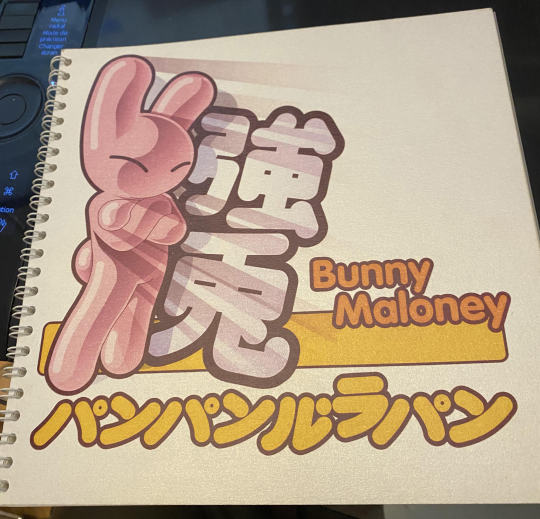
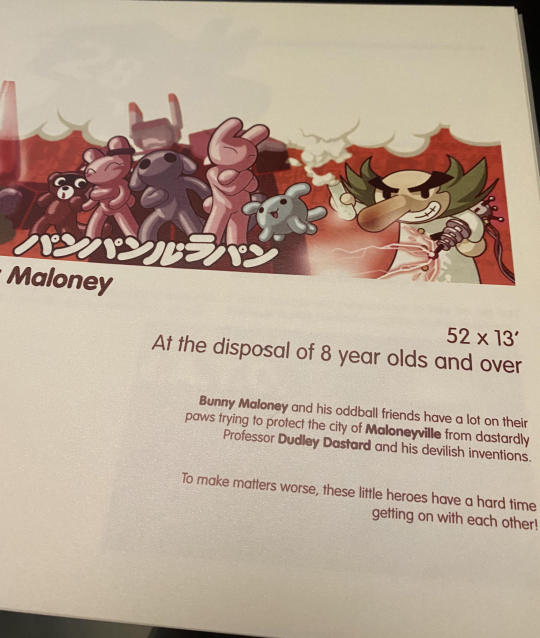
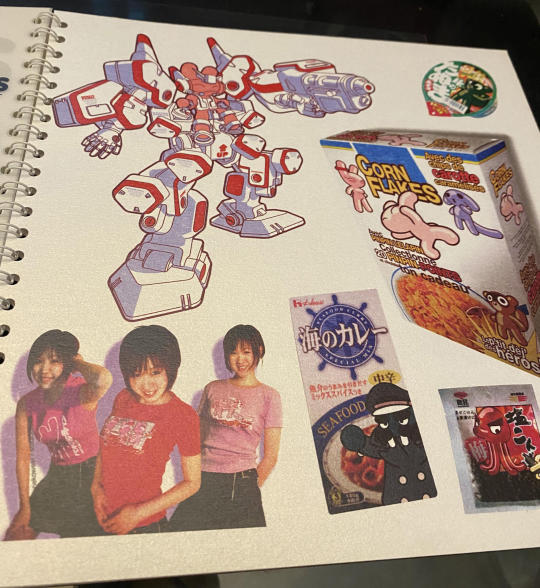
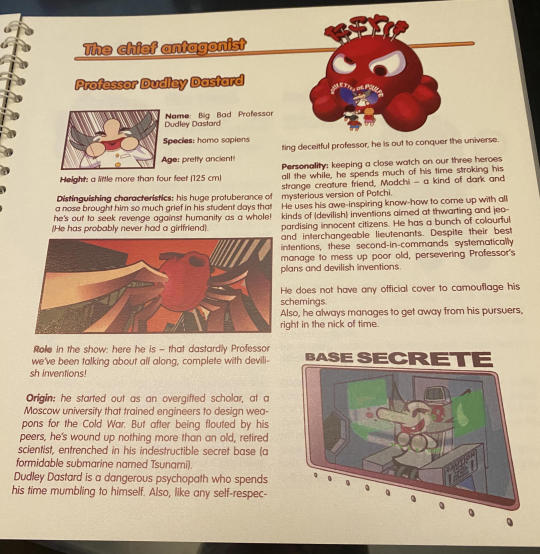
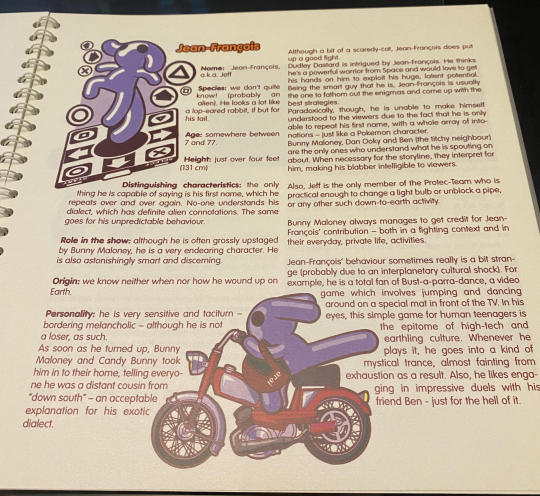
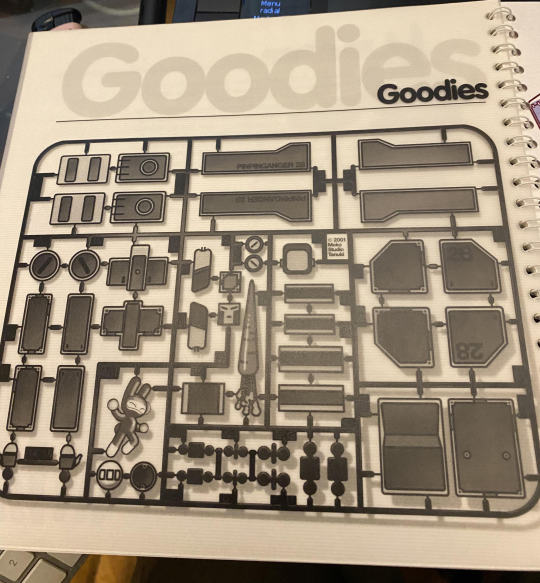
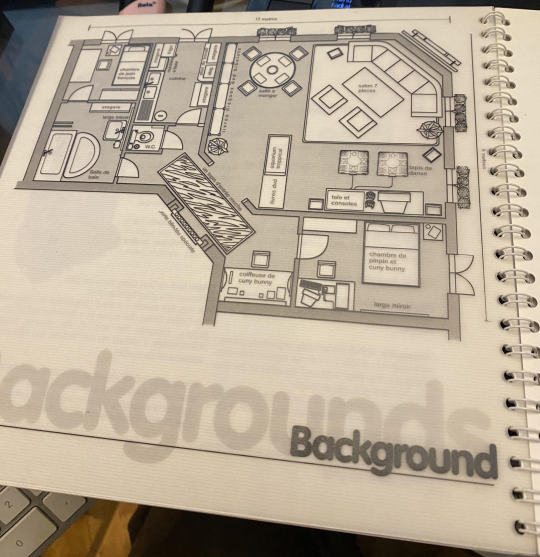
First email + new Charlotte illustration


Follow up email:






+ unexpected twist that Charlotte was meant to be a sheep all along!

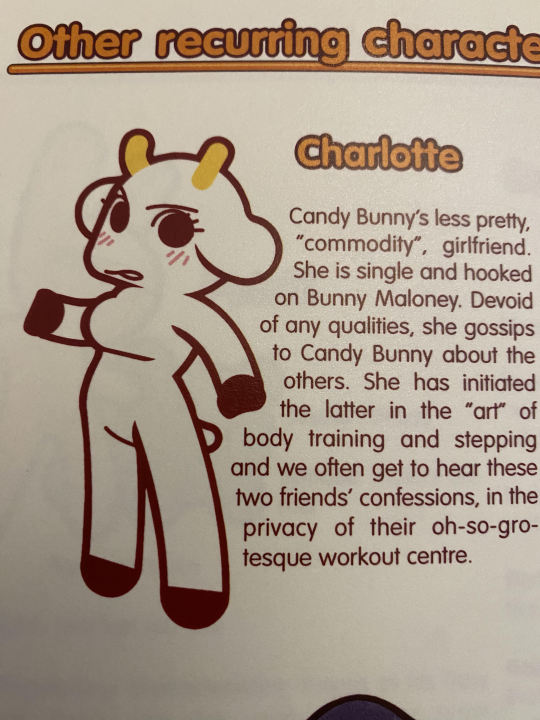
262 notes
·
View notes
Text
Why Tommy is Different to Buck’s Previous Love Interests
and Why it Doesn’t Make Sense.
This is going to be a long and (primarily) impartial post intended for all audiences, whether you like Tommy or not. However, this is not the blog to be airing grievances on. I’m not here for that. I am going to put some opinions of mine through here, but that’s all they are, and I’m going to try stick with facts with a side of interpretation. And Please, for the love of God, read till the end before commenting.
If you want to think I’m nitpicking then go ahead, but every scene of this show gets analysed to death and back for varying reasons. This will be no different.
The Hospital Scene
For the first time, we see one of Buck’s love interests sitting with the 118 at the hospital while they wait to make sure one of their own is okay. In regard to the group chat that appeared on that scene, form your own opinions. We don’t know if Karen or Maddie is in this group chat either. Opinion: I personally don’t think it’s that unusual to have a work group chat, and I also think Bobby showed Athena his phone. I don’t believe that was meant to reinforce the idea that Tommy is an ‘outsider’- if he was an outsider, he wouldn’t have been at the hospital altogether.
Never before has a LI shown up for the 118 at the hospital with Buck. Ali and Abby turned up at the hospital for Buck because it’s him who was hurt, and Taylor was at the hospital with her camera man for the story (s5 May Day). When Eddie got shot, Taylor showed up at the hospital because she thought it was Buck who got shot. Tommy showing up is a unique situation- they were sat in their civvies as a group in the waiting room, and Tommy is there with Buck for Denny. Tommy was part of the 118 waiting room crew; we’ve never seen this before; Buck’s partner showing up for his team(family) at the hospital.
The closest we’ve had before is Abby showing up to Chimney’s return to work party, but at this point they weren’t actually together, and obviously Chimney was okay by this point, it’s not a hospital scene.
The Firefighter Life
When Ali breaks up with Buck, she says it’s because she can’t handle the firefighter life, waiting for him to get hurt. She says it’s not what she wants. This issue isn’t present with Tommy because he is also a firefighter. He knows what he signed up for with Buck, he’s perfectly and intimately familiar with the risks they take everyday and the risk of getting hurt. While it’s a perfectly reasonable assumption that this might still be an issue to some degree, no one wants to see their boyfriend getting hurt after all, they both understand the life and what it means. Tommy solves the reason Ali broke up with him.
The Bobby Approval
This one is a key one. When the scene first aired, I strongly believed (and still do) that this line was also intended for the audience. We have Bobby’s explicit approval of Tommy as a person and for Buck. He’s good people, he’s good for you.
Bobby and Buck never spoke about Natalia or about Ali. I hold the belief, like many, that Bobby never particularly liked Taylor because of how she tried to exploit Bobby in season 2. However, Bobby did help Buck decide on a Christmas gift for Taylor and vice versa. Yet, he never said on screen that he thought they were good together. Hen and Chimney do also come to Taylor for help (s5) with Jonah, but even in that scene they’re shown to not trust her with what they’re telling her.
Abby is more complex as she was a main character in season 1 and her relationship with Buck was a full-season arc. Bobby helped Buck tie his tie and gave him genuinely good advice before their date. Bobby even talks to Buck about having a serious relationship and how to handle it, about how to treat her with respect. Other characters definitely aired their reservations about Abby in season 2 (Is it the age difference? More like the time difference). I believe Bobby gave his implicit, but not explicitly said, approval of Abby through the way he treated and spoke to Buck about their relationship. Despite this, I do think it’s poignant that for the seven years after Buck and Abby broke up, we never saw Bobby approve or like another one of his relationships until Tommy.
The Future Talk
In 8x06, Josh straight up asks Buck if he can see a future with Tommy. This of course follows up Josh already asking “do you care about him, do you think about him when’s not around”. The discussion between Josh and Buck is unique, because Buck has never spoken to a friend about this before. His relationships with Ali and Natalia weren’t developed or long enough to warrant the discussion, he never talked about the future with Abby, and he said “no” at the prospect of proposing to Taylor. For the first time, Buck is asked on-screen if he sees a future with his romantic partner, and Buck says yes. This is explicitly said for the first time. Yes, he made a confused face when Josh asked if he loved him, because clearly Buck hasn’t given it that much thought until he’s confronted with it. Either way, Buck, for the first time, says he wants a future with his romantic partner.
This further prompts Buck to ask Tommy to move in with him, which, different to his motivation for asking Taylor to move in with him, is fuelled by wanting a future. Buck even brings up marriage in his discussion with Tommy, which he’s also never discussed with a romantic partner on screen before. The content of both discussions is something we haven’t seen Buck talk about or admit before.
Eddie Friendship
All of Buck’s love interests, bar Abby, have screen time with Eddie. However, Ali and Natalia only share screen time with Eddie when they first meet because they meet on a call. As Buck’s girlfriends, they don’t share screen time with Eddie.
Taylor once has dinner with Buck, Eddie, and Christopher, and she compliments Eddie’s cooking. Correct me if I’m wrong, but I believe this is the only main time they’re seen together. It’s civil, it’s fine. However, they aren’t friends.
Tommy is a unique situation again; because he’s a guy, it might be easier for Eddie to form a friendship with him. They’re very fast friends, they do Muay Thai together, Tommy works on Eddie’s car, they play basketball together, Tommy went to Eddie’s house 3 times in two weeks and met Christopher. Christopher likes Tommy, he thinks he’s cool, and Eddie invited Tommy to Chris’ virtual birthday party. He’s the first love interest to not only get along with Eddie, but become friends with him outside of Buck (emphasised by 7x04 where Tommy tells Buck that his friendship with Eddie has nothing to do with Buck). The show makes their friendship very clear.
I’ll fully admit that Eddie’s friendship with Tommy was needed for the plot in 7x04, but beyond that, why was it relevant? It already made Buck realise he wanted to be with Tommy. They might’ve needed it for a plot reason but they’re friends afterwards too. Maddie calls Tommy “Eddie’s friend” in 7x05 and they’re laughing together in the hospital and getting alone fine in 8x05. Why?
Fitting Into Buck’s Life
Of course, this all culminates by saying Tommy fits into Buck’s life extremely well.
Tommy doesn’t have to go through the awkward phase of meeting all of Buck’s friends, because the only one he hasn’t met is Eddie. Tommy was previously friends with Bobby, Hen, and Chimney, they already know him. He’s already met Athena. Sure, they might have some catching up to do, but they already have a good history. They’re familiar. Again, Tommy already gets along with Buck’s friends outside of Buck.
Why was Tommy at the hospital for Hen’s son if he wasn’t integrated? Why feel comfortable going to Maddie and Chimney’s wedding? Even Buck makes the point of saying that Tommy is already going to know everybody there; he’s not just his date, he already knows them.
Tommy is friends with Buck’s friends already, Tommy understands the demands of being a firefighter and what it entails with the risks and the commitment. Tommy understands Buck’s friendship with Eddie and Christopher, and his dynamic with Bobby.
Intention (Conclusion)
This is all to say- this is intentional. If the point of the relationship was always to breakup, why have Tommy included in these scenes? Tommy didn’t need to be there at the hospital for Denny, but they wrote it in for him to join the 118 waiting. Bobby didn’t need to give his approval of Tommy on screen. It didn’t further his relationship with Buck nor the plot. It was written this way for a reason, and I think anyone can admit the actual breakup in the scene was abrupt, and it’s all of the above context that makes it even more abrupt.
I know it makes his relationship with Buck more meaningful, sweeter, more heartbreaking for Buck, but we never saw these moments with his ex girlfriends, particularly Taylor, and their relationship was solid until it wasn’t. If this unique treatment of Tommy was meant to put Buck through heartbreak then I offer a second question: what is coming up for Buck that requires him to go through heartbreak?
Why go through the effort of writing Tommy to fit in so well with Buck’s life if he’s only there to further a plot? None of Buck’s other LIs were treated like that, and they achieved the plot they needed to. So why was this different? Buck’s relationship with Taylor was a lot longer, and they lived together, but we never saw these types of scenes with her. Why? Why was this different? What was the point of making the relationship meaningful and different?
Again, this post is not here for people to argue. It should be clear to everyone, regardless of why you think so, that Tommy was treated different by the show than Buck’s other love interests. There must have been a reason, even if that wasn’t clear. Is something big coming up for Buck that he needed to be heartbroken for? Is it poor writing? Is Tommy coming back? There must be some reason that Tommy was treated differently by the writers other than “just because”.
#911#911onabc#evan buckley#tommy kinard#bucktommy#tevan#episode analysis#long post#analysis#8x06#tommy#thoughts#interpretation#tommy was treated different by the show and you can’t convince me otherwise#bbessay
207 notes
·
View notes
Text


ALL I WANT FOR CHRISTMAS IS YOU BY MARIAH CAREY– neuvillette (genshin) x afab!f!reader, nsfw / 18+
genre – fluff, smut word count – ~3,100 warnings – age gap, lingerie, oral (receiving), fingering synopsis – it's your first winter with neuvillette, and where you grew up, it's customary to celebrate by exchanging presents, eating delicious food, and spending quality time with loved ones. even though neuvillette is overwhelmed with work at the moment, you're excited to surprise him.

Neuvillette is known for his lack of personal greed, with the exception of his indisputable particular taste for certain flavors of water. Because of his asceticism, intentional or not, it had been difficult for the two of you to enter the relationship you now are in, but with the incredible aid and full support of the Melusines, the Chief Justice finally distinguished your feelings of likeness separate from others of friendliness and sociability.
To his end, though, you are known for your intensity, speech sharp with judgment, gaze watchful and vigilant, pen always in hand, scribbling away at a new manuscript or op-ed for The Steambird. Originating from Sumeru, you had been well aware of the turmoil brewing within the Akademiya, and managed to flee, even with such knowledge, to Fontaine. Here, you have been able to continue your studies from where you left off, as well as pursue your own endeavors in writing, which had long been restricted when you were a student. In fact, it was precisely due to one of your well-received yet controversial pieces in the newspaper that had landed you an opportunity to interview Neuvillette and ask him questions on questions regarding his thoughts on governance, the limitations of rule and government, and checks and balances.
You intended it to be a one-off instance, fully knowing that the Chief Justice is incredibly busy. However, you had a bad habit of losing track of time, and he is more than happy to speak in length, and your first conversation did not end on a fulfilling thought. As a result, for several months on end, you would spend two hours every three weeks with Neuvillette, which, by then, it was more than obvious you had developed intimate feelings for him.
Of course, even though you two are now a couple, the dynamics of your schedule have not differed by much. Neuvillette still has a limited amount of time to see you, though it is permissible for you to make more spontaneous visits to his office, if you are so inclined. But being the studious writer that you are, you still have not acted upon this privilege yet.
“You really should take up more of his time!”
You squint your eyes over the rim of the teacup that you are sipping from, taking several moments to think of a proper response. A part of you is still ruminating over the last draft of your manuscript, something you have been losing sleep over to make it in time for the deadline for The Streambird’s short story contest at the end of the month, but you know you should be more focused on the conversation at hand. After all, while Miss Furina is beloved by the people and is commonly seen out and about, it is still rare for her to request a private audience with someone as little of importance socially, politically, economically as you are.
“Miss Furina, I’m not sure I follow?” is the best you can manage. You take another sip as the celebrity huffs in disappointment.
“How trite! It has been so long since my last visit to the Palais Mermonia, yet even I’ve been made aware of Neuvillette’s situation! Please tell me you at least know of that!”
You open your mouth to release a hum of agreement. “Yes,” you say, “though I am not sure what his condition has to do with his schedule? Wouldn’t it be more advisable for him to go rest, instead of having me bother him?”
“You are incredibly dull, my friend.”
You nod slowly, noting in your head that she is sassier than she lets on, easily overpowered by her stage presence and bright smile. Regardless, you are still not sure if you ae thinking on the same lines as she is.
Miss Furina gives you a few more seconds to think on your own, but seeing the lack of any recognition or realization on your face, she sighs before flinging three sugar cubes into her tea with exasperated movements. She then grumbles, “Neuvillette does not rest until the Melusines kowtow and beg. Could you not at least help save them some face and demand of him to rest a day or two?”
You watch as the sugar begins to dissolve into the tea. When instructed as such, there really is no harm in doing so. You nod again, and Furina yelps with delight, clapping her hands in a circle.
“I try my best to not get involved in his affairs anymore, but perhaps this is just my way of slowly repaying his efforts. Anyway, I need to carry on with the rest of my day. Good luck, friend, and cheers to your union!”
You realize you did not ask the more glaring questions of this conversation. You are not sure how Miss Furina knows of your relationship with the Chief Justice in the first place, or why you are the one settling the bill for lunch. You shrug as you wipe at your mouth with a tissue, thinking of ways to convince your partner on stepping away from his impending cases for at least a few hours.
The solution comes quite easily, frankly speaking. In part of your intense and serious attitude, you are also associated as being very independent, so when you send a note to Neuvillette requesting his assistance later in the evening, he replies immediately in complete compliance. That way, you did not have to risk interrupting him in the midst of his work, while still satisfying Miss Furina’s plea.
In reality, though, you only got lucky because you had happened to remember today’s date. You do not quite recall how you thought of it – it could have been a street sign or a poster that you spotted from your periphery –, but the whole point is that this day used to be very important to you as you grew up. Though you are not upset or even the slightest bit nostalgic, you think it is the perfect excuse to save your partner from undue stress and cacophony.
Thus, you make your way to several shops before returning home with two small boxes and a bag in your hands. There are a few more hours before Neuvillette is to arrive, so you shuffle all of the scattered loose leaf paper into haphazard stacks and stuff your ballpoint pens into your drawers to make room on your desk to wrap the presents you bought.
–
When your partner comes, it is already dark, overcast with dense clouds that pour incessantly. He knocks at your door just as you are stoking the flames in your fireplace, and you pace over to let him in.
You open the door to a very concerned Chief Justice.
“Are you alright?” are his first words.
You cannot help but feel guilty at deceiving your partner.
You place a hand on his arm, which he returns with the same gesture, and you rub soothing circles into the fabric of his coat. “Yes, I managed to figure it out.”
“Are you sure you don’t need me to revise your draft? I am more than willing to, might you think my input may be necessary.”
With gentle tugs, you lead him to your rounded dining table for two, where there are already steaming mugs of tea settling on their matching saucers, and the two of you take your usual seats across from each other.
You feel no need to keep up your lie. “My sincere apologies, Neuvillette, but there’s actually no manuscript you need to help with. The Melusines had specifically asked of me to find a way to extract you from your work, lest you become glued to your chair.” You leave out any mentions of Miss Furina out of respect for her privacy.
“Ah, I see.”
You observe his face, careful for even the faintest of shifts or twitches to anticipate his reactions. But Neuvillette’s impartiality should never be underestimated, and his expression does not change at all.
“Are you upset?” you ask.
He glances at you, having previously been staring into his cup. “Uh, no, I… I suppose I have been dealing with a torrent of work. I apologize for having concerned all of you.”
You set your hands out, and Neuvillette holds them in his palms. You admire the feel of his gloves against your bare skin and watch as he thumbs over your calloused fingers.
You finally manage to hum, “No worries. Though, I have a few things I want to give you, so your visit’s not entirely a waste.”
His grip tightens. “It is never a waste. Forgive me, for neglecting us.”
You chuckle before slipping your hands out of his hold, and patter over to the wrapped presents that sit on the floor to the side of the fireplace.
“Here,” you say, as you set the gifts in front of him.
“What occasion are these for?” he asks, eyes glimmering with fascination. You have always loved Neuvillette’s eyes. While his face may be as set as stone, at times, you can tell fragments of his thoughts by the color and brightness in his eyes.
You have not told him much about your upbringing, and you do not feel inclined to dwell on it tonight either. So, in the briefest way possible, you explain, “When I was growing up, every year on this day, the community I was a part of would exchange gifts. There was also a large feast, with plenty to eat and drink.” You give a light shrug before finishing, “I just thought it would be nice to share a bit of my past with you.”
“I understand,” he replies, eyes and tone soft and gentle. “I’m afraid your presents will have to wait for next year.”
You know time means nothing to him, but his words still melt the rough, unromantic edges within you. You smile to yourself as you watch him unwrap the pen and bejeweled brooch you had bought him. Finally, when he moves onto the bag, you laugh as you see him tear away his gaze before shakily handing you the box from inside.
“This, um, seems to be yours.”
You release an intrigued noise before nudging the box back toward him. “It is still a present for you.”
“How so?” Neuvillette’s cheeks and ears are tinged with a warm red, and you are sure it is not solely because of the fire.
You get up from your chair, round over to his side, and stand beside him. “I forgot to mention,” you tease, “but this day’s particularly special for couples. They celebrate together, spend time together, and… need I say more?”
You and Neuvillette have slept together before, though the number does not exceed single digits despite the two of you having been together for a little less than a year. Such occurrences are usually a result of your or his feverish desires exceeding a certain boiling point, and you suppose this time, you are the insatiable one.
“Look inside,” you instruct with a flick of your chin. “Do you like it?”
Folded neatly inside the box is a red satin tank top and sleep shorts. The color shines brilliantly under the flickering of the flames, and you appreciate the contrast of it against the purple and indigo of Neuvillette’s eyes.
“Yes, o-of course. I’m sure it suits you well,” he mumbles, blush flushing deeper and deeper with every passing second.
You pat his shoulder. “Perfect. I’ll change in the bathroom, so wait for me on the bed.”
If it was really up to you, you would not even change in a separate room. But, for the sake of your easily flustered partner, you show him some mercy and grant him no more than two minutes of reprieve. As Neuvillette said, the set does fit you, in ways other than just size, and you are glad you decided to go the extra length to splurge on lingerie, as it is also a treat for yourself.
When you enter your bedroom, barely concealing the skip in your step, you see Neuvillette seated on the corner of your bed, unmoving. You doubt he has barely even breathed since you left him alone.
“Neuvillette?”
His head shoots up at your call of his name, but he fails to respond. His eyes, which were staring holes into the ground a mere second ago, are now drinking in the sight of you in your new clothes. They linger at the exposure of your neck and collarbones, the outline of your breasts, the flare of the top around your waist, and the contrast of the shorts’ red sheen against the suppleness of your thighs. You find yourself almost feeling shy at his undivided attention, and you rock on your feet, waiting for him to make a move.
Neuvillette only breaks out of his reverie once he has looked over your entirety. “You look mesmerizing,” he praises. He makes it sound like a truth, a new law he has amended into Fontaine’s books, something everyone should know and accept by now. It is your turn to shudder and lose your composure at his words, so you do not even try to respond, and instead, walk over to stand in front of him.
However, he quickly switches your positions, gliding you over to sit and him kneeling between your knees. He presses fleeting kisses on the inners of your knees, before slowly traversing up the length of your right thigh, nuzzling and pressing and licking. You squirm as he sucks on your skin, and gasp at every mark he leaves.
It is unbelievable, you think. Back in Sumeru, you were constantly teased, others mocking and prophesying that you will forever spend this special day alone. Yet, you are grown now, and being lavished and indulged by another, by your lover.
You try your best not to muss Neuvillette’s hair, so you clutch onto his shoulders. Digging your fingernails into the white silk of his shirt, you barely contain your whimpers as your partner begins to approach the heat emanating between your legs. You jump once you feel him press the pad of a finger against your hole, and cannot help but moan as he kisses your clit, the satin of the shorts doing nothing to dull the sensations.
Though Neuvillette’s actions are restrained, limited to only kitten licks and playful flicks with his fingertip, your pleasure compounds at an exceptional rate. By the time he lifts you up to slide your shorts off, you have already stained much of the fabric and are continuing to leak, wetness dripping down your inner thighs and the bottom of your ass.
“Absolutely decadent,” he mumbles, gazing with much adoration and intensity at the way your legs shake and your clit trembles.
Before you can say anything, he takes your breath away as his lips close around your sensitive bud. He taps and laves his tongue against the hood, pressure just enough to choke you from pleasurable stimulation. His hands are wrapped tightly around your thighs, to hold them in place, as well as bite his nails into your skin, although you have no idea when he took his gloves off.
“Neuvillette,” you breathe out. He hums around your clit with a more forceful suck, and you reel over, hunching over his head, hands sliding down his back and crumping his shirt within your grasp. Your partner understands your reaction as a subconscious plea to move on, and so, he licks his way down to your hole. He can feel it open and close around nothing, and it is only then that he is made aware of how painfully hard he is.
You grit out, “More – please.”
He knows he cannot further deny you. He laps at your entrance, entranced by your taste, before finally pushing his tongue in.
You are warm, sweet, incredibly tight. He pulls back, draws a large breath, and dives back in, pushing himself as far in as he can. Since the very beginning, you have been very sensitive, always reacting to even the lightest and briefest of touches, so Neuvillette knows your body must be overwhelmed by everything he is doing to you. He knows this is the case when he leans back on his heels for a quick rest, and sees your face, sweat tracing your hairline and eyes glazed over. For some reason, Neuvillette finds himself growing even larger, even harder, at the sight, and he distracts himself by returning to his place between your legs.
This time, he goes faster, accompanying his tonguing with circles of his finger around your clit. He can also hear you muffling your noises with the back of your hand.
“Please, let me hear you,” he says, between movements of his mouth and hand. “I need to know that you are feeling good.”
You are so used to practicing restraint and discipline, so you hesitate at first. But when Neuvillette presses your clit in that exact way you like and tongues you so deeply, you moan out loud, giving in regardless of your own wishes. And because he is incredible, precise, with analyzing your needs, he keeps doing it, giving you what you crave and desire over and over and over again, until you are brought over the edge.
Neuvillette groans as your hole flutters around his tongue, more of your taste filling his mouth, and he drinks in whatever he can. At this point, you are holding his head against your body, almost bucking your hips to close whatever distance is left, so that you can extend your high.
By the time the two of you peel apart from each other, you are about to unzip his pants before you notice a stain. You look at Neuvillette’s face, only to find him with a flushed, euphoric expression, and you feel surprise and delight wash over you.
“We will continue tomorrow morning, if that is alright with you,” he says, a little out of breath. You, too, are still heaving, so you nod in agreement.
Back at home, this day was spent with several people under a clear night. You would all be gossiping, dancing, discussing, and by the end of it, you would exchange gifts, though for most of it, you were left to your own devices, reading storybooks in whatever dimly lit corner you could find. This time around, though it is raining outside and there is no one else besides you and Neuvillette, you think this is the best celebration you could ever have. You would not wish for anything else, as long as you have him.

winter event masterlist


#genshin impact#genshin impact x reader#genshin x reader#genshin fluff#genshin smut#neuvillette#genshin impact neuvillette#genshin neuvillette#neuvillette genshin#neuvillette genshin impact#neuvillette x reader#neuvillette fluff#neuvillette smut#carrot cake!#house of solis occasum#nereids' realm
197 notes
·
View notes
Text
Why aren't comics more common in TTRPGs?
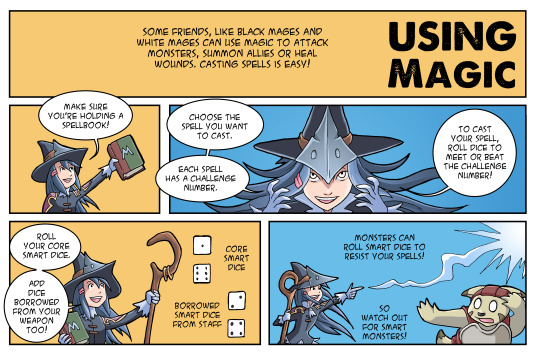
(This is about game design and presentation) In school one of the things I discovered is that I have trouble absorbing info from a big text book. And most TTRPGs are presented as text books. Once I understand the basic information in the book (chemistry textbook or RPG sourcebook or whatever) I can deal with the book on my own terms. I can dive into individual parts and learn, and slowly absorb the book as a whole. But I need help to get there. I need an access port. Sometimes this comes in the form of someone explaining the book to me. Explaining the rules of the game or the outline of an essay. This is great, and gives me a way in so I can absorb and master the book myself. But I don't always have someone in my life who can do that. Interestingly, I don't have this problem with novels at all. Narrative feels easier to access, at least for me.
In school I also discovered Scot McCloud's Understanding Comics. This is a pretty fantastic book which I'd recommend to everyone. It helped me understand how I process information. More importantly, it helped me understand the different people process information in different ways. I hadn't realized that at age 16, although I was starting to suspect it. Before I started making comics or games I used to be a teacher. As a teacher I could see that some of my kids were struggling with the information I was giving them, in the same way I had struggled in school. I started using comics in class to help reach these students. I'd draw little comics on my handouts or on the whiteboard to explain what we were learning. The goal wasn't to provide an entire lesson in comics form. I'm not Scott McCloud! Instead, I was trying to find an access point for my students. An on ramp. A port of entry to the ideas and material we were covering so they could engage and eventually absorb the information. It worked so well. It worked like magic. Why don't we do this more in TTRPGs? I used comics in my early games, Panty Explosion Perfect and Ocean. These were narrative comics, not rules comics, but the goal was to provide both an example of what play looked like (from a narrative standpoint) and a point of access for players who weren't sure what the game was or how to engage with it. My thought was that if you understood what the game was supposed to look like it would be easier to approach the rules. (A short comic from Ocean. The book has a bunch of these)
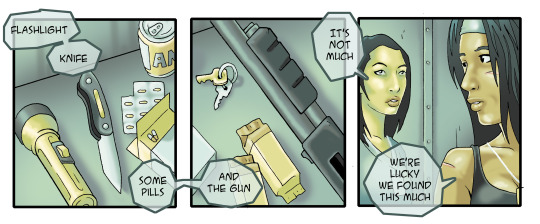
When my brother Nick and I started working on The Magical Land of Yeld I knew I wanted to use comics more directly as a teaching tool. Especially because part of our target audience was new and younger players who might look at a big text book (Yeld is a giant 400 page hardcover) and just bounce right off it. Like I did in school and like I often do with big games. So I needed to teach with examples and illustrations, and especially comics.
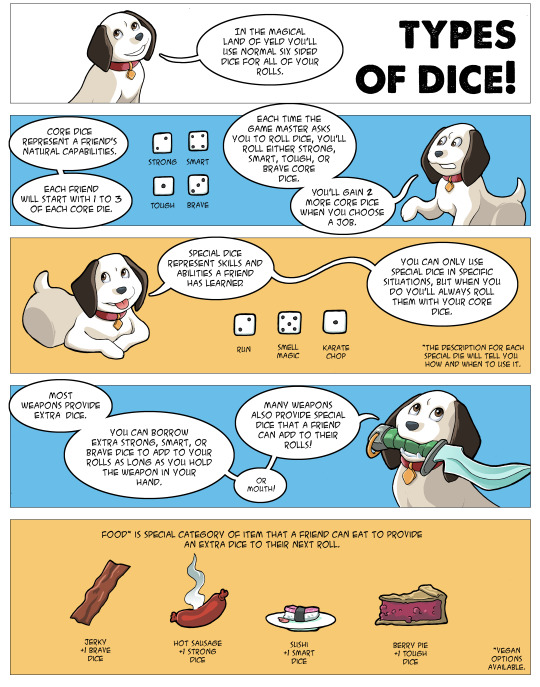
The first comics you'll encounter in the Yeld book are narrative, and designed to get you into the ideas and themes of the game. But in the first few pages we also start sprinkling in rules comics. These are presented along side the rules text. They don't replace that text, which is important. The text explains the rules in greater detail, and includes information that just couldn't be added in a single page comic. Instead, the comic is intended to be a point of access to the rules text. A player can read the comic, understand the basic concept, and feel comfortable engaging with the text. That's the goal, to make players comfortable and to make the rules text accessible.
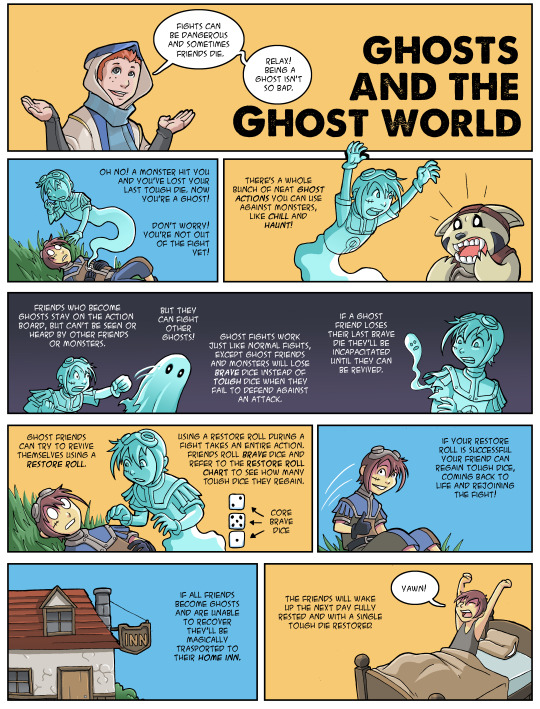
We use comics to teach basic game mechanics, but we also use them to explain specific player facing systems. Sometimes these are things that really do need a comic to explain them, but sometimes we use comics as lures to draw player attention to mechanics that we're afraid they might otherwise not engage with. For example, in playtesting we found that when characters died during a fight the player would just sit there for the rest of the fight and not engage. It turned out, since you don't do anything in D&D once you die (except slowly die more), most players assume that's how all games work! So they hadn't even noticed that in Yeld you become a Ghost and get to ghost around and do fun Ghost stuff! I decided to create a comic that not just explained this but drew attention to it and showed why it was a fun (and important) part of the game!
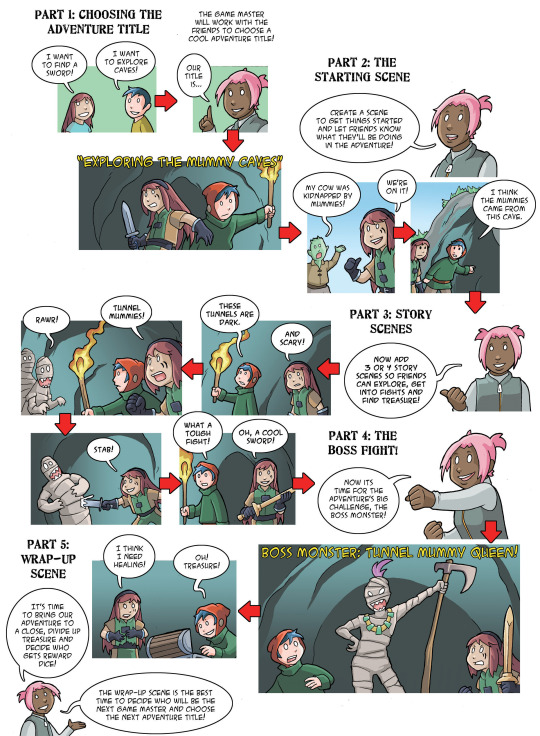
Structure of play isn't always obvious to players, especially if they're new to TTRPGs or have only played D&D. You pick up habits from the games you play the most, and since most gamers play nothing but D&D there is a tendency to assume EVERYTHING works like D&D. Yeld doesn't, so we decided to take nothing for granted and make comics that very specifically show what a session of play looks like. In this example, it may not look a lot different from D&D, but the adventure is specifically divided into 5 parts. The comic illustrates these parts in a way that is easy to understand. The accompanying game text explains each part in more detail and illustrates how they are important to play. The comic serves as a ramp that gets players to the info they need.
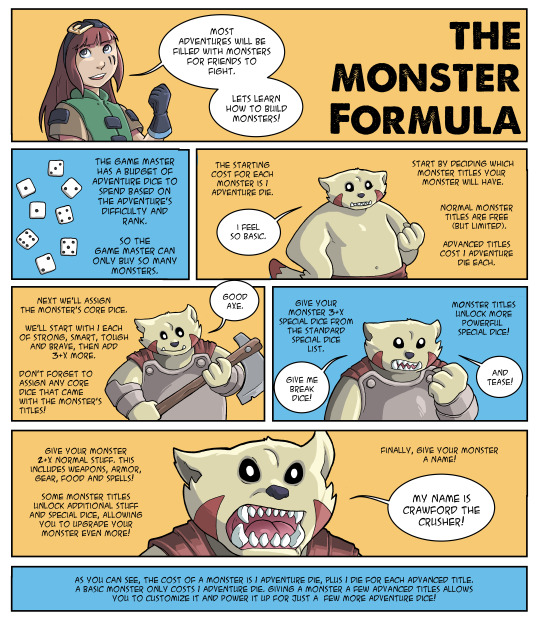
Not all of our comics are player facing. Yeld has a rotating GM (which is awesome, btw), and this means every player gets a chance in the Game Master roll. Which means every player needs to understand how this roll works. Comics like this one, which explain how to build monsters to use in your game, help make the process easy to understand. Again, its about building a point of entry for players. A player might say "I don't want to GM, it sounds to complicated!" But its not. You just need to make it easy for them. Make the mechanics and responsibilities easy to understand. Show why they're fun! In Yeld, its important that each player takes on the GM role from time to time, since we're building a story together. Making it look fun is important! Comics help with that. What's more fun than comics?
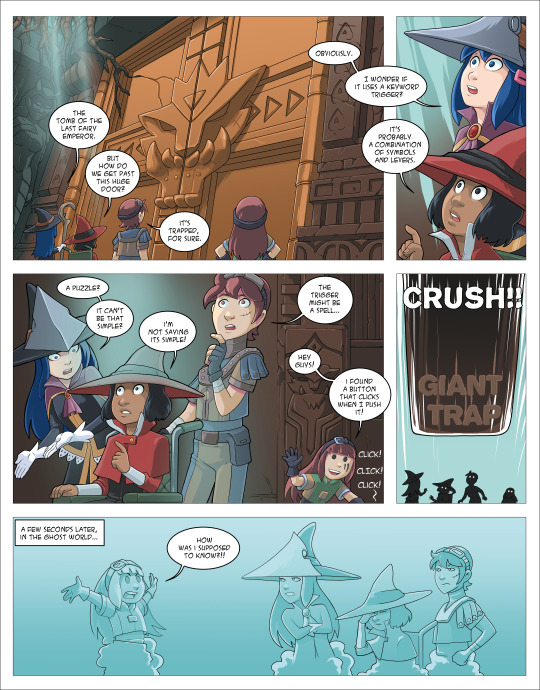
Narrative comics are important too. At least for Yeld. I don't think every game benefits from them (although I always love seeing them). Narrative comics show players what the game is supposed to look like. What the characters do and say. What environments they visit. Narrative comics set a tone. Narrative comics let new players understand what a game is about immediately! We can hand a Yeld book to a new player or customer and they know what's up in seconds, just by reading a short single page comic. That's a powerful tool. So why don't more games use comics? Part of it is that game creators are usually not comic creators. There's not a lot of crossover. That always surprises me, but both disciplines take a lot of work. Who has time for both? Even when you have game designers that are comic creators, they often don't include comics in the games (Lancer???). I don't think this means game designers don't recognize the value of comics. I've had this conversation with so many game designers, and they usually agree that comics are useful tools. But if you don't know how to make comics, making comics for your game can be daunting. What rules should you focus on? How do you present that information in comic form? How many comics should you make? How do you hire someone to make comics, anyway? Hiring artists is expansive, btw. You know that, of course. Hiring an artist to make a set of comics for your game could cost you thousands of dollars (or more), depending on what you want. Of course, you can try to make your own comics. And you should! Really! A poorly drawn comic is not necessarily a bad comic. The point is to get your information across to your reader. to provide a point of access. You don't need great art for that (although great art can help attract people to your game). Stick figure work just fine. Here's an example, the layout for the Tea Dragon card game. Another artist took this layout and redrew it in their own style. But my goal here was to be simple and concise with my explanation of the rules. To make the game accessible.
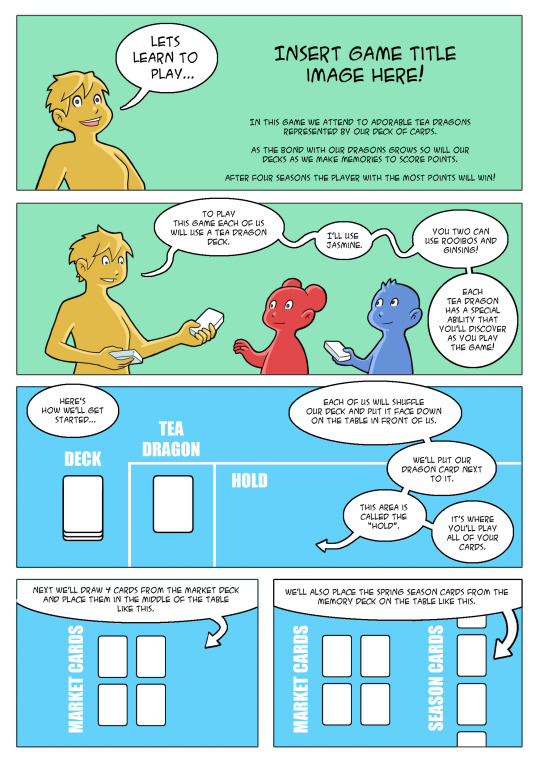
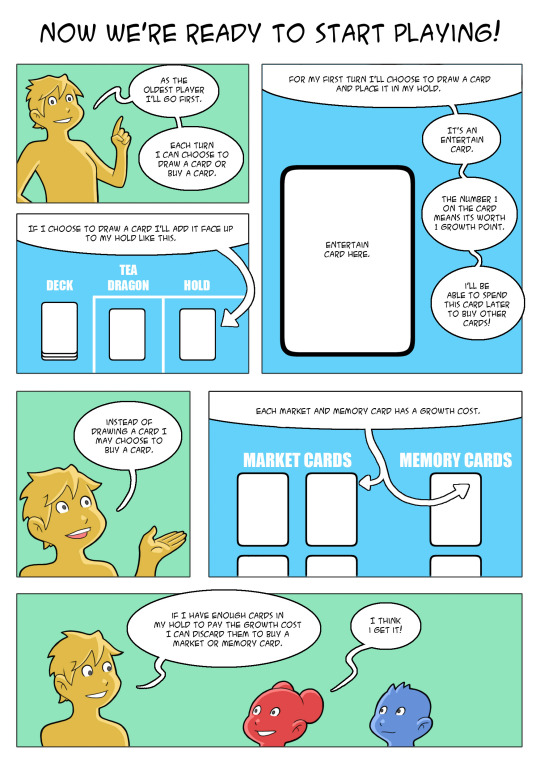
There's a few more pages of this, but you get the idea. The purpose is to explain, and make the player comfortable with learning more. The art matters to the extent that it serves this goal. In fact, flashy or complicated art can get in the way! You'll notice in that most of the Yeld rules comics I posted above the art is pretty simple, with solid color backgrounds. You want to make your comics as easy to read as possible, and that includes avoiding clutter, overpacked word balloons and messy layout. Readers are easily distracted. It doesn't take much for them to set down a book at all. A complicated phrase or hard to read font can often be enough. And once they set a book down they may not every pick it up again. That's more true for a big text book than it is for a comics, but its still true for a comic. So our goal is to make our comic the easiest, smoothest point of access it can possibly be. So easy and smooth that the reader can slide right into the rules text without noticing! Here's my general process for creating a rules comic. This is from my friend Brian's game Scofflaws. I start by taking the basic mechanics that need to be illustrated and breaking them down into panels. The goal is to make each panel readable and not overwhelm the player. At this point I'm just doing a rough sketch. It may not eve=n be readable, but that's fine!

Next, I refine the text and art. I decide on the exact language I'll use, and I finalize where characters and other elements will be placed. As you can see, the actual layout didn't change much here. Sometimes it changes a lot!
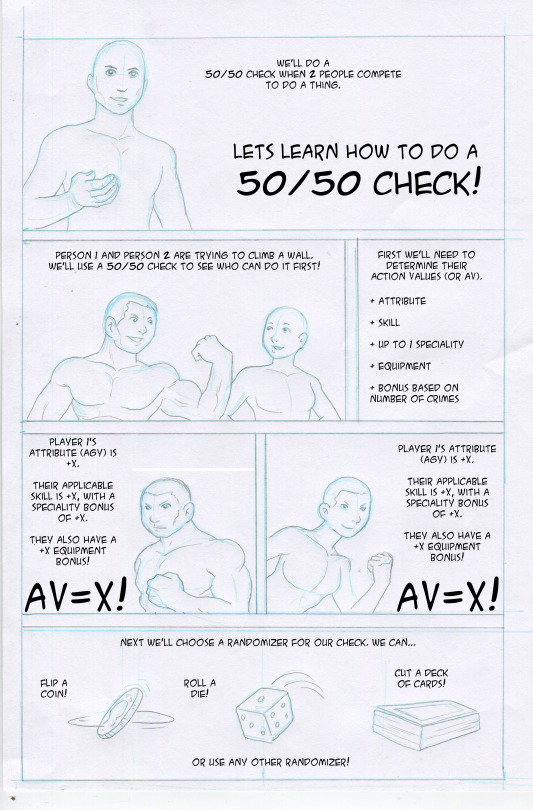
Finally, I create the finished art. Honestly, the previous step was just fine. It explanans the rules I wanted to explain. But this last step allows me to add in some narrative flavor. The first panel contains a complicated background in order to present the game's setting. The characters look like the kind of characters you'll play in the game. This isn't nessacary for presenting rules, but it helps present the game as a whole. You want players to engage with every part of your game. The last thing you want them doing is picking up your dungeon crawling game and going "Oh, this would be great for playing Star Wars!"
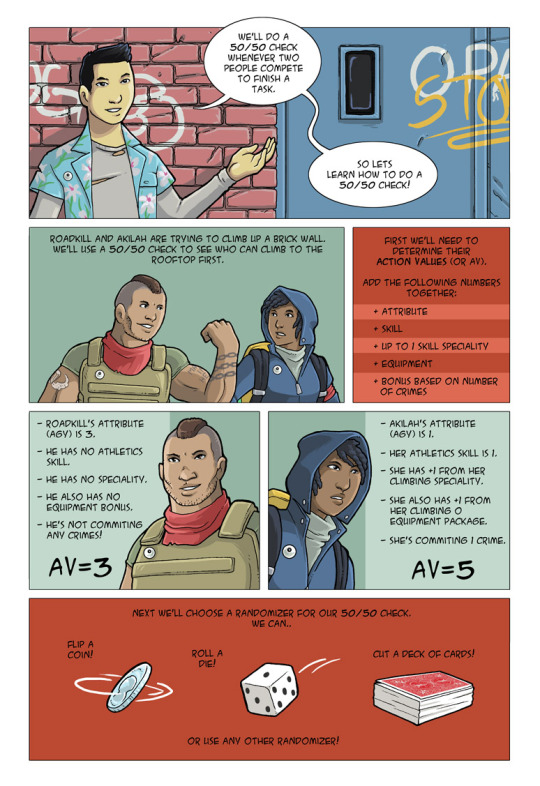
(I probably shouldn't have chose than shade of red for the background. It makes the text a bit hard to read!) So again, why aren't we seeing more comics in games? Its not as if they don't exist at all, and I'm personally always excited to see them. I recently opened the Final Fantasy RPG box set and was so happy to find the rules were accompanied by cute comics. And there's lot of other examples (maybe you can post some in the comments). But I think comics are a clearly underused tool in game design and presentation. And as a comic person, let me tell you that you're leaving a valuable tool on the table if you're not considering using comics. Are they right for every game? Maaaybe not? But I think MANY MANY MANY games could benefit form them. Are they expensive? They can be. Are they hard to make? They can be. Are there people you can go to for advice? Hey, my door is open.
#game design#ttrpgs#ttrpg design#ttrpg community#ttrpg#roleplayinggames#comics in games#comics as a teaching tool#teaching with comcis#put comics in your game for fucks sake#yeld
180 notes
·
View notes
Text


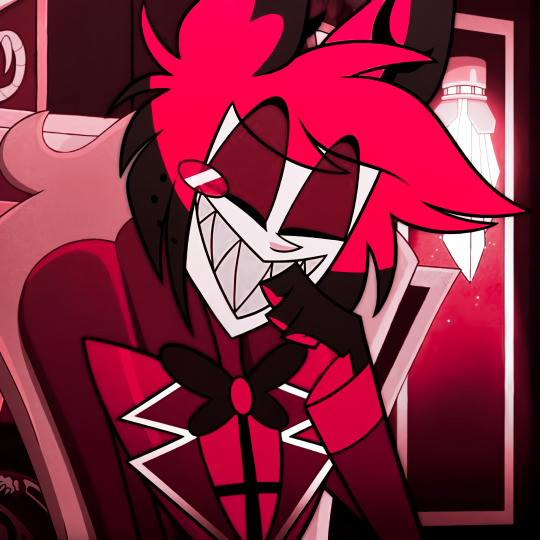
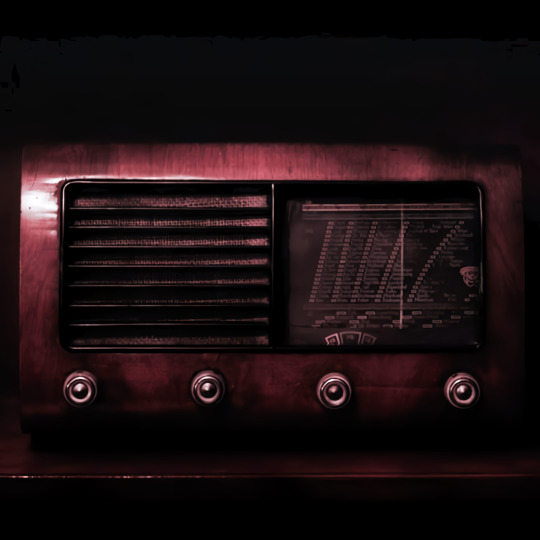

“Remember, dear, the key to being an excellent broadcaster isn’t just having a pleasant voice, but knowing how to use it to capture and hold your audience’s attention. Speak to them as if you’re sharing an intimate secret, something only they should know. Make every word feel as though it’s meant solely for their ears.”
Alastor's voice flowed smoothly, weaving through the air like a hypnotic melody, and it took hold of you in a way that felt almost suffocating. His red eyes glimmered with a dark amusement, a twisted joy in watching your reaction. There had always been something unsettling about him, a danger lurking just beneath his charismatic exterior. But tonight, that danger felt closer, more present than ever before.
“Do you understand what I’m saying?” His voice dropped lower, no longer just instructive but now filled with an edge of menace, as if testing how much you could handle. His gaze bore into you, evaluating, judging.
You swallowed hard, feeling the weight of his words press into you, constricting your breath. “Yes, Professor. I understand,” you managed to say, though your voice came out more fragile than you intended.
Alastor’s smile deepened, predatory, as he closed the distance between you with slow, measured steps. Each one made your heart beat a little faster, the tension building as his shadow loomed larger. Though he stood only inches away, it felt as though his very presence consumed the room, suffocating any sense of control you thought you had.
“Good,” he purred, his voice a whisper laced with satisfaction. “Then let’s test that understanding, shall we?” He handed you a script, his fingers brushing against yours for a fleeting moment, leaving a trail of warmth that lingered far too long. “But this time, I want you to read it as though you’re speaking directly to me, as if every word is a whisper meant only for my ears.”
You took the script with trembling hands, the paper feeling heavier than it should, as if it carried the weight of the moment. Your eyes skimmed the words, but focusing was difficult with him so close. His proximity was overwhelming, the heat radiating off his body like an invisible force that seemed to pull you in. You could feel the breath of his words still clinging to your skin, each syllable echoing in your mind like a spell.
“Slower,” he murmured, leaning in just enough that his lips brushed the shell of your ear. The sensation sent a shiver down your spine, making it hard to concentrate on the script in your hands. “Take your time. Control the rhythm of your words, just as you would control an audience. Let them hang on every syllable, every pause.”
You tried to follow his instructions, your voice faltering as you read. But it wasn’t just the words that were slipping from your grasp—it was your own control. You could feel his presence everywhere, an invisible hand guiding you, pushing you further into the depths of something you couldn’t fully understand.
Alastor’s hand slid down your arm, so light it was almost imperceptible, yet it sent a spark through you. His touch was both comforting and threatening, a duality that left you frozen in place. You knew you should resist, should step back, but instead, you found yourself leaning into him, letting his energy consume you.
“Better,” he said softly, though his tone was still thick with dominance. “But you’re holding back. I want more.” His fingers trailed down your spine, and every inch he touched ignited a fire under your skin. “You’re trying to control your voice, but you need to let go. Surrender yourself to the moment, to the power of your words.”
Your breath hitched as his hand came to rest on your waist, a subtle but unmistakable claim. He was testing you, not just your voice, but your will. And the worst part was that you could feel your own resolve crumbling, your body betraying you as it leaned further into his control.
“I... I don’t think I can,” you whispered, barely able to get the words out.
His laugh was low, almost sinister, as he tilted his head, his lips ghosting over your neck. “Oh, but you can, darling. You just don’t realize it yet.” His voice wrapped around you like a noose, tightening with every breath you took. “You’re not here to think. You’re here to feel, to experience the raw power of your own voice... and mine.”
Without warning, he plucked the script from your hands and tossed it aside, his actions deliberate and dismissive. “Enough of the formalities,” he said, his tone dropping to something far more intimate, more dangerous. “Now, I want you to speak from here.” His fingers brushed over your chest, just above your heart, and then moved downward, tracing a path that left your skin burning in their wake. “From your soul.”
Your heart pounded in your chest, the room growing hotter, more oppressive. His hand rested on your hip, pulling you gently but firmly toward him, and despite the alarm bells ringing in your head, you couldn’t resist. You didn’t want to. Alastor’s gaze was magnetic, a dark promise of pleasure and pain that made your knees weak.
“Control isn’t about restraint, my dear,” he whispered, his lips so close to your ear that his breath sent shivers down your spine. “It’s about knowing when to let go. To let someone else take the reins.”
Before you could react, his lips met yours, and the world seemed to stop. It wasn’t a gentle kiss. It was consuming, filled with a hunger that felt centuries old, as though he was devouring a part of you. And you... you gave it willingly. His hands moved with expert precision, tracing the curve of your body, igniting a fire that burned hotter with every touch.
Your mind screamed that you should stop, that this was wrong, that he was playing you like a puppet on a string. But your body, traitorous as it was, responded to his every command, melting under his touch.
“Alastor...” you gasped between kisses, but he silenced you with a look, his eyes burning with that same dangerous glint you had seen earlier.
“Shhh,” he whispered, his voice dark and velvety. “Now is not the time for words. It’s the time for surrender.”
His hands slid under your shirt, the cool air meeting your heated skin as he pushed the fabric away. Every movement was deliberate, calculated, as though he was savoring the moment. His fingers danced across your skin, making you arch against him, seeking more of his touch.
“You see?” he purred, his voice dripping with satisfaction. “This is what true control feels like. You think you’re helpless, but in reality, you’re exactly where you’re meant to be. In my hands.”
You tried to speak, to regain some sense of control, but the words died in your throat as his lips found yours again. This kiss was different—slower, more intense, as if he was drawing out the pleasure, savoring every second of your surrender.
The world around you seemed to blur, your senses overwhelmed by him—his scent, his touch, the sound of his voice in your ear, promising both salvation and damnation.
And in that moment, as his hands moved with precision, as his words wrapped around you like chains, you realized the truth: you were his. Entirely, utterly his. And there was no turning back.
#hazbin hotel#hazbin hotel x reader#hazbin hotel alastor#alastor#human alastor#alastor x reader#alastor x reader smut
237 notes
·
View notes
Text
this isn't at all meant to be condescending or finger-waggy because 100% we all have blind spots like this, but I'm really, really hoping that the people who never found Gaiman's approach to his own fandom concerning in any way will take this all as a learning moment.
he was an older, hyper-famous author engaging directly and frequently with an online audience of largely vulnerable young marginalized people. he presented himself as cultured and worldly, and made himself approachable as someone to go to for advice, encouragement and "wisdom." his manner of speech was extremely pathos-heavy and clearly intended to be comforting and encouraging in exactly the way his target demographic needed it to be to swallow every word. the way he spoke about stories and creativity was designed to make young creative hopefuls feel special and important, while sweeping real analytical techniques under the rug - in hindsight, likely so no one would think too critically about the disturbing amount of patriarchal abuse played for cheap shock value and voyerism in his own body of works.
Gaiman saw a target demographic that was desperate for an older creative role model to tell them they were worth something, and he exploited that pain to twist a narrative around himself where he was king and any critique leveled at him or his works were the enemy.
to be clear, he could have been innocent. he could totally have been just an out-of-touch old man saying nice things to people because he wanted to be kind and he thought he was a lot smarter than he really was. red flags are warning signs, not a surefire way to tell if someone is actually "secretly shitty."
but if you used to look up to him, PLEASE take this moment to revisit the ideas you absorbed from him. did you take his words to heart because they seemed to have objective merit? or did you take them to heart because it felt good to believe what he said? do you still hold these values? does knowing he was intentionally manipulating his online audience make you less certain? do you need more information from a different source before deciding one way or another?
again, I'm just really, really hoping people on here will take a moment to reevaluate the ideas and opinions he's injected into tumblr fandom culture, because his reach is immense and he has absolutely been manipulating popular perception of relevant topics to gain further influence and control the narrative around both his own and Pratchett's legacy. please, please take this moment to notice what he's been doing - and next time someone tries to pull the same shit, hopefully we'll be able to apply what we've learned from experience.
#deerchatter#abuse cw#im going to be honest i came to hate him over his years on tumblr.#even if he'd done nothing wrong he was normalizing an extremely unhealthy relationship between a fandom and creator#and he always spoke with so much pathos and so little actual substance. he's an idiot desperate to seem smarter than he is#obvs didn't assume anything about his actual moral character but he sure was spreading some toxic ideas intentionally or not#absolutely heartbreaking and horrible that things turned out to be as bad as they were.#genuinely wrote this out because im hoping this can all AT LEAST make some people aware of the tactics he was using#so the next shithead celebrity who rocks up to social media with an agenda won't have as much reach#counting on people to read the best intentions into this post. i don't give a shit about celebrity drama i want people safe#edit: actually fuck it putting this in the tag#neil gaiman
387 notes
·
View notes
Note
I’m really impressed by your analysis of Raf’s new card! Everything you stated makes so much sense and gave me a fresh perspective on his insecurities.
However, I recently came across a discussion on Reddit where someone pointed out that Rafayel's actions could be seen as problematic. They argued there’s a lack of consent from MC, suggesting that MC wasn’t fully into it. They mentioned the use of the dagger as a symbol of the MC's discomfort or pain, which they attributed to her being tense or unrelaxed. They also highlighted how MC seemed to try distracting him, like asking him to answer the phone or pointing out the snow.
Personally, I don’t agree with their interpretation, but I’m struggling to articulate why. Do you have any thoughts or interpretations that might help address this perspective?
Okay, um. First and foremost, thank you for sharing your thoughts and for trusting me with this question, but god did I literally react like this.
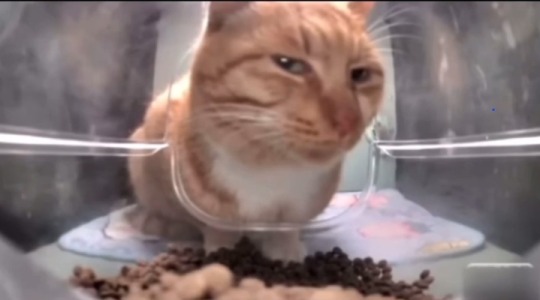
But, before we get into the analysis of the deed itself, let’s start first by grounding this discussion in the context of the product that is Love and Deepspace.
This is a 12+ rated action-adventure sci-fi otome game, which sets a clear expectation for the tone and themes presented. While otome games can and often do explore nuanced and occasionally darker themes (and this doesn't mean they have subpar writing just because they're meant for a wider audience), they are typically balanced with the age-appropriate rating in mind. In a banner like this that is intentionally designed to revolve around romantic sex, it’s essential to recognize that the developers aren’t aiming to create content that veers into dead dove or non-consensual territory. To suggest that the writers or developers would include something as serious as this, especially under the guise of a romance storyline, is not only a misinterpretation but also an extreme departure from the genre’s conventions and the intended tone of the game.
The entire theme of the event is centered on exploring romantic tension, intimacy, and the growing bond between characters in a way that’s exciting but ultimately safe and consensual. The "spice" in these scenarios is shockingly suggestive when you have the censorship in mind, and designed to make us scream, not to introduce dark or inappropriate themes that would completely undermine the romantic fantasy. To imply otherwise is frankly absurd and feels like reading intent where there is none.
1) Otome games, particularly those rated 12+, are crafted to engage players in a romantic and emotionally fulfilling experience. They're fluffy, they're angsty, they can be dark and heavy, but even in more mature otome games, themes of non-consent (when they appear) are explicitly framed and addressed with appropriate tonal shifts. This isn’t a game where heavy, disturbing themes are shoehorned into a romantic storyline for shock value.
2) If the developers were truly presenting a situation where non-consensual sex or coercion was involved, it would be a complete betrayal of the genre, the event’s theme, and the player’s trust. The "spice" banner would instantly alienate the audience it’s designed for and spark backlash, not romantic engagement. The devs know their audience and their ratings, and this simply isn’t the place or context for something so serious.
Now that we're done WHY this sort of scenario CANNOT be the case for infold's writing, let's go into the symbolism and the language used to describe the act.
Rafayel enters the room abruptly and begins kissing MC without preamble. While this could initially seem forward, the scene takes care to show that:
MC actively breaks away to question him multiple times. This demonstrates that she is neither overpowered nor silenced, she has the agency to assert herself.
When she bites his lip, Rafayel respects this boundary and answers her questions, and more importantly, stops being non-verbal and communicates. It shows he is responsive to her cues, even when caught up in the moment.
The dynamic here leans into playful tension rather than coercion. MC’s actions (breaking away and biting) and Rafayel’s response (answering her and continuing to interact with her desires) showcase a mutual push-and-pull, common in romantic tension scenes.
As the scene progresses, it becomes clear that MC is not just passively involved but actively reciprocates:
Holds his hand on her own to make him accept the call while they're being sexual. That's freaky.
She flips him over and begins initiating physical affection, kissing him from his ear to his chest. This is a strong indication that she is not only comfortable but also eager to participate in their intimacy.
The "punish" action selected by the player highlights MC’s playful intent and interest in this interaction, especially in the context of teasing Rafayel while his friend’s call looms in the background. This playful edge basically screams mutual enjoyment rather than discomfort.
And now to the main course
the dagger
Listen. As much as we've normalized that this is dick in puss moment, infold can't. So, they've got to use euphemisms to describe Rafayel's dick and what he does with it. The metaphor of the "dagger" isn't meant to represent his dick and it hurting her.
Soft sharpness seeps into me bit by bit: This describes the initial entry, slow and deliberate, emphasizing Rafayel’s care in ensuring the act is comfortable and mutual. "Soft" reflects the intensity of the sensation without implying pain by juxtaposing with "sharpness". It also tells you that "soft sharpness" is his dick and it's describing how gentle he's being. How can sharpness be soft? When you're careful with it that it doesn't feel "sharp" anymore. It's meant to be a stand-in for his cock. It's not describing pain. It's his peanis. The dong. The verb "seeps" here says all you need to know, it's not painful.
Then it (the <<soft sharpness>>) digs into me like a dagger: This directly describes Rafayel increasing his movement (or thrusting), with the "dagger" symbolizing THE MOVEMENT. You know what you do with a dagger? Stab with it. The imagery of a dagger isn’t meant to evoke harm, it’s a stand-in for the deliberate and rhythmic motion of penetration.
So, in smut-language, Rafayel was putting it in slowly, then half-way, he thrusted it all the way in, quickly.
And so, let's interpret the act going forward.
"Yellow sand as far as the eye can see is covered by snow"
Remember that Rafayel indirectly called MC "the snow" by saying "it was soft and beautiful" when she pointed out it was snowing in the desert? This metaphor reflects the emotional and physical dynamic between Rafayel and MC. The “yellow sand” symbolizes Rafayel and his inner turmoil, dryness, and insecurities. The “snow” represents MC and his soothing presence and how her love transforms and comforts him. They are also on top of each other lmao, he is being “covered” by her presence, fully surrendering to her.
"We approach the sea beyond the dunes despite the bumpiness"
The "sea" symbolizes climax or release, both physically and emotionally. The “bumpiness” describes the physical intensity of their rhythm as they near this point together.
"Ripples travel along the undulating water's surface"
Yep. They're still going at it. This metaphor captures the sensations and physical effects of reaching climax. The ripples signify the aftereffects of release, the pleasure that radiates and envelops both of them. This is Rafayel and MC experiencing the peak of their intimacy, with the “undulating water” representing their synchronized pleasure and satisfaction.
"Swept into that endless blue"
Post-orgasm bliss. The overwhelming euphoria and serenity that comes with shared climax. It emphasizes the emotional connection they feel in this moment—boundless and all-encompassing.
"This isn't the abyss. Rather, it's a place filled with red flame lilies. This is Rafayel's color."
Now, this is MY interpretation, so take it with a grain of salt.
The "abyss" here symbolizes the emotional and creative void Rafayel has been experiencing--his lack of inspiration and his deep-rooted insecurities that leave him feeling hollow and disconnected. The abyss represents the blank canvas of his mind.
The transition from the abyss to the field of red flame lilies signifies a turning point for Rafayel. The flame lilies are not just a burst of inspiration, they are deeply tied to MC and the way she has reignited his passion BEYOND pain, both as an artist and as a person capable of love and connection.
By stating, “This is Rafayel’s color,” the narrative emphasizes that the flame lilies are uniquely his. They symbolize the return of his personal brand of creativity and vibrancy. It’s not about finding generic inspiration, it’s about rediscovering his own voice and perspective and MC doesn’t simply provide inspiration, she helps him unlock what was already inside him, and I believe, somehow witnesses the bursting of life inside him in her mind throughout the bond they share. MC serves as the guiding force that helps him reclaim his “color,” allowing him to see himself, and his art, in a new light.
Flame lilies are striking and bold, often symbolizing passion, love, and transformation. They’re an apt metaphor for Rafayel’s internal rebirth. Where the abyss was blank and desolate, the lilies are vibrant and overflowing with meaning, mirroring his renewed sense of self.
So, yeah.
And let’s be honest if you’re going to suggest non-consensual sex in a scene where MC flips him over, actively teases him, and metaphorically commands his every move through a glowing mark on his chest, then maybe it’s time to step away from the Reddit threads and reconnect with nature, maybe consider why you're intentionally picking on Rafayel like this.
He even asked, “Are you sure?” AND checked in with her later with "Are you comfortable?" -- all green flags here. If that’s not the gold standard of consent in an otome game, I don’t know what is.
I hope this was satisfactory, anon!!!!!
#love and deepspace#rafayel#rafayel lads#lads rafayel#rafayel qi#lads#l&ds#l&ds rafayel#rafayel l&ds#fandom: lads#rafayel x mc
130 notes
·
View notes
Text
Was Caryn Pines a good or a bad mom to the Stan twins?
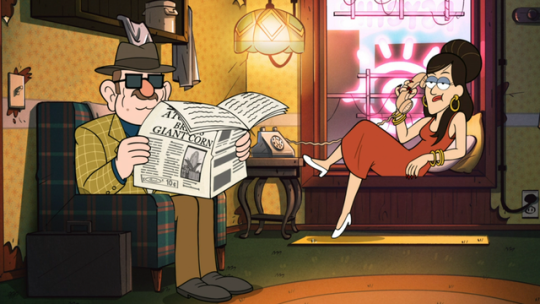
Stan introduces us to Caryn’s character by describing her in the following words: “Mom was a pathological liar, which served her well as a phone psychic.” She is also, canonically, a kleptomaniac. “Pathological liar” and “kleptomaniac” aren’t the first terms you think of when you picture a stereotypical housewife back in the day, are they? So that’s already proof she can’t be put in a box together with the “women of her time.”
Let’s get this out of the way: she does not fear Filbrick and people should stop using that as an excuse for her actions (or lack thereof). But she isn’t totally uncaring, either. I present you a canon analysis of the relationship between Caryn and her kids under the cut!
Usually, the possibility of Filbrick being abusive towards Caryn is a headcanon born not out of any canon evidence, so to speak, but specifically the need to excuse Caryn not intervening as Stan was being kicked out, even though she watched it happen, just as Ford did. However, this is not what we see in the comics:
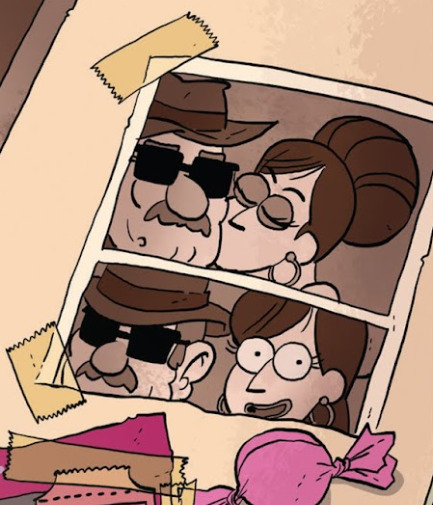
Caryn initiating the kiss/affectionate physical contact, and smiling brightly and genuinely to the camera.
And, again:
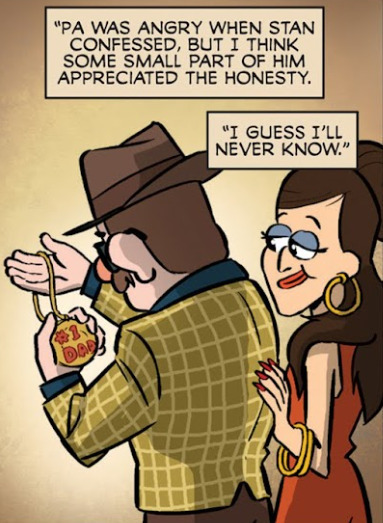
She’s presumably alone with Filbrick here, again initiating affectionate physical contact, and looking at him with an expression that can only be described as very tender.
In both panels, she doesn’t look afraid of him at all. Not even remotely. She knows the man she married and she loves him. I think this might confuse a lot of people given what we know of Filbrick, but in plenty of relationships irl, a man will hit his children and then turn around and call his wife affectionate pet names; an abusive parent will see their children as beneath them to discipline as cruelly as they please but see their spouse as much more of an equal in the family structure.
I know a few of you might be thinking that these two panels don’t represent the totality of their home life/the relationship between Filbrick and Caryn. After all, there is abuse in “loving” marriages as well, right? It’s a complex situation. And I would agree with you, if we were talking about real life instead of a cartoon. Gravity Falls is a cartoon and all its characters are fictional and 2D, lacking the complexity of real humans—what we know about them is what is shown to us by the writers, and what is shown to us is intended to represent the characters in their totality and dictate how the audience should interpret them. We’re meant to fill in the gaps using what is offered to us as a basis. While you are free to headcanon Caryn as being abused by Filbrick, it doesn’t have any canon evidence to back it up, simply because the writers did not mean to imply that. If they did, she would have been written differently.
Take as an example Mrs. Gleeful (Gideon’s mom), who, despite not being abused, seems plenty terrified of the events happening around her:

When I focus on a Watsonian approach, I sometimes wonder if Caryn might not have been intended as a questionable mother, but that a questionable mother was simply the woman we ended up with given the writers’ lack of thought about their side characters and/or struggle to write female characters compared to male ones. I’m not entirely sure about that, though; a friend once pointed out Filbrick and Caryn are exactly the kind of parents you would expect the Stan Pines you knew up to AToTS to have, intended to sort of explain the two sides of his personality to the audience: a father packed to the gills with toxic masculinity and a lying, cheating mother. One thing I’m certain was intended, though (and if Alex ever releases canon material retconning this fact, it will be just that: a retcon), is that Caryn does love Filbrick.
The GF Wiki describes her as “paranoid, traumatized and disturbed” right off the bat. It isn’t subtle at all, because it’s a cartoon. Caryn, on the other hand, doesn’t show the barest hint of fear. On the contrary, they make a point of showing her happy with her husband and her family, overall. To convey that she isn’t abused is much more difficult to do, as a writing choice, than the opposite—simply portraying her as abused, that is. Think about it: there’s no way she could have possibly been written to show she wasn’t abused except through visible proof of her happiness.
In conclusion, she probably didn’t want to leave or divorce Filbrick, either. Not because she couldn’t or was afraid to, but because it was her choice to stay with him.
Now, can we blame her for that? That’s complicated too, I believe. I don’t think that physical punishment, even if severe, would be automatically be seen as abuse or anything of the sort in whatever period their lives took place, 1950s or 60s (Alex is insistent on the fact the show isn’t supposed to have an actual timeline, but an “emotional” one). I think this can be applied to a lot of other behaviors. I’ve seen many older adults saying, in my country, that “back in their day” an adult could silence their child with just a single look, just by raising their eyebrow. I don’t know how things were in the USA, but I bet kids were expected to be more “respectful” and “obedient” and a lot of what would be considered abuse nowadays was then considered an acceptable way of raising a respectable citizen. So Caryn, too, might have interpreted her husband’s behavior as his way of “toughing up” the boys.
I personally headcanon (emphasis on headcanon! I always keep headcanon and analysis neatly separated, and we’ll soon return to the analysis) Caryn as having Stan as her favorite. Most people with siblings seem to think there’s always a favorite one for each parent, and we know of her canonically being affectionate with Stan! She’s the one who says he has “personality,” who calls him her “little free spirit,” who asks about him to the principal when Ford himself doesn’t. She’s one of the only two people who attend his fake funeral, according to the TBoB site, and the other person was an IRS agent. On the other hand, we know virtually nothing about her feelings for Ford in particular/specific, other than the fact she at the very least doesn’t feel negatively about him—no nicknames, no praise, not much of anything. I like to think Ford is not disliked, but Stan is her baby. It makes sense to me because Stan was a talented and creative liar, like her, while she couldn’t relate much to studious Ford. (It’s also fun to give Ford mommy issues, hahah. It would be pretty ironic if, while Stan is confessing to Ford about how upset he feels that Ford is Filbrick’s fave, Ford was internally harboring similar suspicions towards their mom.)
Back to the analysis—these are the two instances in which we see her acting as a mom, in TBoB and the comics respectively:
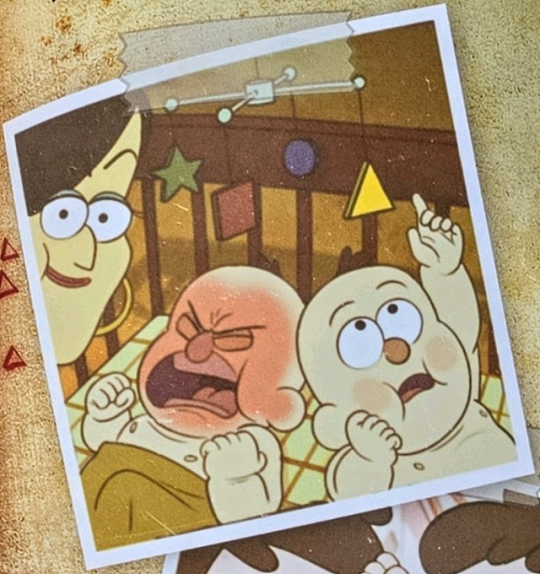
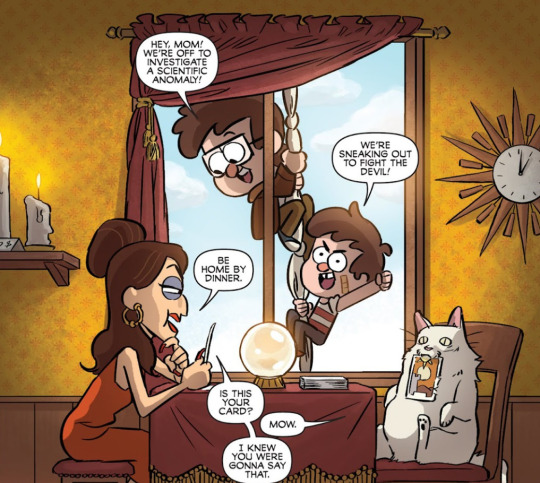
In the first picture, she’s smiling at the camera with one of her babies crying in the background. In the second, she doesn’t seem very bothered by the fact her troublemaker kids are “sneaking out” (very probably so Filbrick doesn’t see them) to “fight the devil.” She doesn’t even ask for more information or scolds them for climbing down a sheet from their window (when they could easily fall and get seriously hurt), just tells them to be back home by dinner.
I think she did love them in her own way (she wouldn’t have been one of the two people to show up to Stan’s fake funeral otherwise, since there was no benefit in doing that), but that way of hers was clearly not the stereotypical, overprotective, nagging, fussing mother hen way. I see her characterized as some sort of Mrs. Weasley from Harry Potter far too often (probably because people have an idealized concept of How A Good Mother Should Behave in their minds, and with the lack of canon information about Caryn, that’s the default set for her), when truly her style of parenting seems closer to Grunkle Stan’s style of grunkling.
As an example, Stan smiling and reassuring himself as the kids fight like crazy in the background:
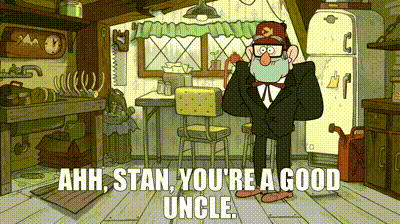
Except, of course, that she was a woman and didn’t have Stan’s weird hangups about masculinity, so she wouldn’t shy away from being more openly affectionate, cooing, praising.
Except, also, that she didn’t intervene when her kid was kicked out, while Grunkle Stan, who does everything for his family and is unflinchingly loyal to it (even to his own detriment), absolutely would have intervened in her place.
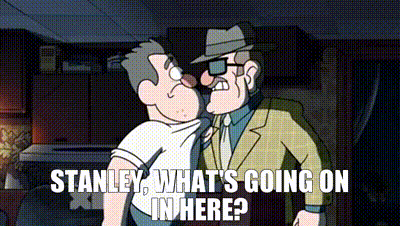
She sounds confused, a bit concerned, but again, she was not afraid to make her presence known and walk into the scene and ask what was going on as her husband was visibly very angry. Her tone is not of a panicking or scared woman.
Then, Stanley calls for Ford to defend him, not her. Ford, his brother, same age as him, who was at the moment beyond furious with him and very unlikely to show any compassion. Ford, whose attempts to change Filbrick’s mind would more likely than not have been unsuccessful. Not Caryn, adult, who probably had much greater sway over Filbrick. They say a child’s first instinct is to call for their mama. Clearly not in this case!
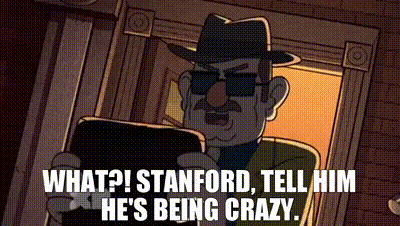
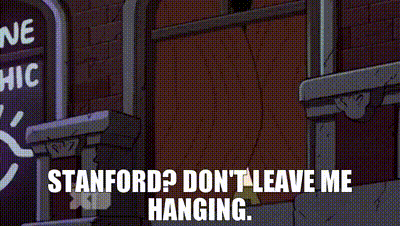
I’ve seen many people headcanon that Stan kept in contact with her, or else Ford couldn’t possibly have known Stan’s address. I think they might be forgetting the magic omniscient Mailbox! That’s my own headcanon to how Ford managed to get it. (Frankly, I don’t think the writers thought too much about it, so I doubt there’s an official explanation; if there is one in the future, it’ll be a retcon for sure. That’s how GF works.)
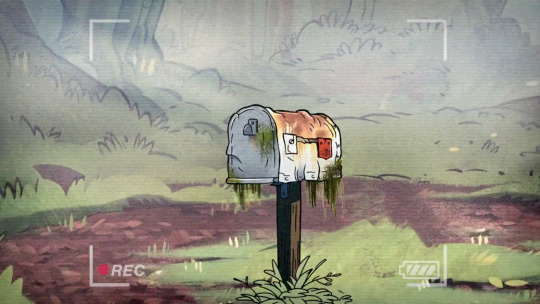
Think of Stanford Pines’ character and how he operates, how he always avoids asking for help, how self-sufficient he always attempts to be. He has two options: one involving phoning his mom and asking for his twin’s address and fueling gossip/assumptions that he was ready to reconcile with Stan, and another one than involved just Ford himself and supernatural/magic means, like an old, magic mailbox. Which of the two is more likely to be his choice, especially in his paranoid state? (And speaking of the mailbox, Ford wouldn’t necessarily have had to ask it about Bill’s weaknesses. By the time he needed Stan’s address, he had already tried using many of Bill’s canon weaknesses against him and failed, so he wasn’t struggling due to lack of knowledge.)
When Bill threatens Ford, he says no one would miss him if he died out there in the snow, which implies that, at least from Ford’s point of view, that would be believable (since Bill wouldn’t brag about something absurd and meaningless but something that he assumed could actually hurt Ford):

Bill mentions, in that order: Fiddleford abandoning Ford, Filbrick not wanting Ford to return without millions, and Ford’s lack of friends. No mention of either Stan or Caryn. If you want to be more charitable towards Caryn, perhaps this is Bill refusing to remind Ford of any person that could possibly love him. Even then, Ford’s mind doesn’t immediately go to Stan (presumably because of their fight) nor to Caryn (presumably because of Ford’s estrangement from his family) as a denial/protest against Bill’s words.
Ford also admits he had abandoned their family to become a recluse:

Caryn was very likely included in the “family” he felt like he had abandoned.
I’m not saying that Stan wasn’t keeping in contact with her, but that if you choose to think he was, that’s also a headcanon. I personally can see it, since Stan is a character who always prioritized family above all, while Ford was growing increasingly isolated and estranged from them.
Ultimately, when it comes to Caryn, I think her character depends a bit on Filbrick’s. The worse you headcanon Filbrick to be, the worse it looks for her as a mother. Fortunately for her in my case, I don’t headcanon Filbrick to be a stereotypical monster that beat his sons black and blue all the time. I think he sucked at parenting, but not exaggeratedly so, and in a way that could still be socially acceptable back then.
Meanwhile, in the fandom, I think there’s a tendency to portray Filbrick as Terribly Bad and Caryn as Undoubtedly Good, demonizing one and idealizing the other to the point you stop and wonder: how did this wonderful, perfect woman even marry this man? I believe the black & white extreme contrast is appealing, in a poetic sort of way—a helpless saint stuck with a monster—but not that realistic considering their situation.
It’s also more comforting to imagine her as extra motherly to compensate for the fact Filbrick was so terrible. Shermie also gets this treatment, in a way, being headcanoned as a very protective older brother that would often defend the twins from his father’s wrath. It’s just... sad to imagine our beloved blorbos Stan and Ford didn’t get much protection at all.
I don’t believe they were very protected, but I also believe that Filbrick also wasn’t that terrible. That time in which he attempted to “sell” Stan after he got a bad grade (according to the TBoB website), for example? I doubt he was actually selling the boy. Way more likely that he was humiliating the boy, which is obviously very, very bad, alright, but not to the levels of actual child trafficking.
I actually can see Caryn intervening in certain occasions, telling her husband to chill, that this time Stan (his favorite victim, despite the fact Ford also suffered with his expectations in a different way) was innocent, that they were just kids, but not forcefully so. Not in an “insistently, angrily putting her foot down” way. You could, of course, also headcanon Filbrick was that terrible but threatened the boys so they didn’t tell their mom and Caryn remained blissfully unaware of the worst—if that’s your cup of tea. Even if she were unaware of the worst, though, there are things she surely wouldn’t have missed while living under the same roof as Filbrick and the Stans without plausible justification, so I wouldn’t abuse that excuse.
It’s also possible to me that she knew some of it and started deceiving herself and coming up with explanations to soothe her own mind, perhaps even dissociating a little. She wouldn’t want her Filbrick to be a terrible father, so she pretended that he wasn’t. This hypothesis, ironically, would give her a fitting similarity to her son Ford: the worst liar is the one who lies to herself.
I’m not a great fan of the idealization of Caryn as a mother because that’s somewhat sexist to me. You know, how mothers are definitely treated differently than fathers, and often put on a “can do no wrong” pedestal with higher expectations? Society often forgets that women with children are people first, mothers second. I think it’s possible for a female character that is also a mom to be a good character but not that good of a mom. Caryn, imo, gives off more cool wine aunt vibes than she does motherly momma.
But we know that, despite her shortcomings, she does cherish her family.
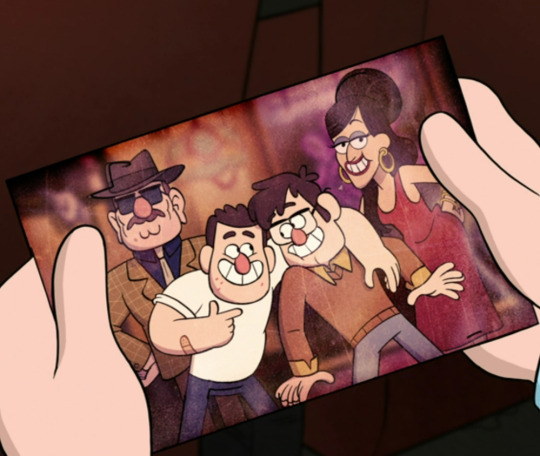
Stan and Ford probably have many fond memories of her, such as this one in TBoB:
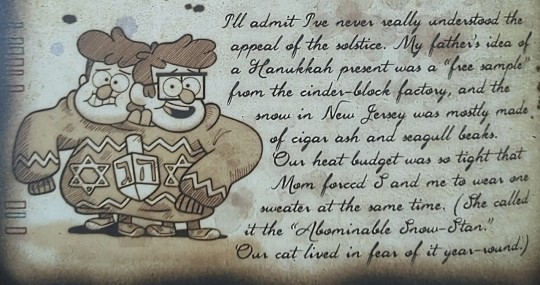
At least we can assume that, despite her husband’s idea of a Hanukkah present being actual cinder-blocks, which Ford felt the need to mention to the reader, Caryn herself must have gotten them more decent/normal gifts with the budget they had.
Or here, in J3, where we can probably assume Caryn was included in the “family” that attempted to comfort Ford about his extra fingers (I can’t imagine Filbrick being this sentimental):

She is also described as a “caring mother and kleptomaniac” on this Lost Legends website that I believe few people know about the existence of (the same that revealed her full name to be “Caryn Romanoff Pines”), but considering Alex’s acidic/sarcastic tone I don’t know if we’re meant to take the “caring” adjective very seriously. Especially because he has said before, in the DVD extras (AToTS commentary), that Stan attempted to get from the public “the affection he never got from his family and lost with his brother.” (Such statements seem conflicting with each other, so I prefer a middle ground approach.)
Narratively speaking, I believe she loved her boys and her boys loved her, but not enough to take away Stan’s protagonism in Ford’s life and Ford’s protagonism in Stan’s life. They’re meant to rely mostly on each other, to the point Alex confessed in HanaHyperfixates’ and ThatGFFan’s interview that he didn’t elaborate on Shermie’s character because Stan & Ford were meant to part of a duo against the world and an extra sibling would alter that dynamic:
In terms of Shermie, I remember asking Rob or somebody at some point, like, “Would Shermie be here, logically? Do we have to see him?” I don’t really wanna see him. I’m not interested in that. I’m interested in Stan and Ford being—sort of having only each other and then losing each other because of their different life paths.
I think the suggestion was, “Maybe Shermie would be a baby. Maybe that would happen.” And being like, “okay sure.”
That said, I also believe people don’t get that. I’m tired of this being my experience in this fandom:
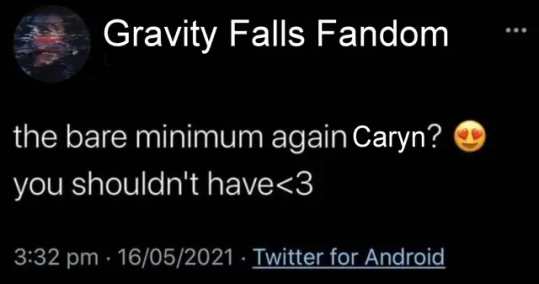
(Sorry, I had to include a meme.)
She’s excused for not intervening that night even as her seventeen-year-old son, Ford, is not extended the same courtesy. She’s also often put on a pedestal for... being present at her own child’s funeral? It’s ironic how, despite her fanon self being idealized by the fandom as mothers are idealized by society irl, her canon self is treated by the fandom as fathers are treated by society irl: the bare minimum becomes cause for celebration.
It might sound like I’m being too harsh on her, but I didn’t write this to attack Caryn. On the contrary, I think it’s very, very nice that her character is so difficult to pin down, as either a fully bad or a fully good mother. She has nuance, imo, and that’s a very delicate trait for any fictional character to have because the fandom never handles it well. Why? Fandoms in general prefer drama over nuance. (I’ve seen the contrary happening, too: a few fans getting so fed up with fanon Caryn that they decided to write her as completely uncaring.)
Ultimately, my own answer to the question posed in the title is: neither, but at least she (probably) loved them. Reading all of this, different people might have reached different conclusions, deeming her as either good or bad. That’s just proof, imo, of how hard it is to crack her. Good for her.
#caryn pines#stan pines#stanley pines#ford pines#stanford pines#filbrick pines#pines family#pines family meta#stan twins#stan twins meta#gravity falls#gravity falls meta
126 notes
·
View notes
Text
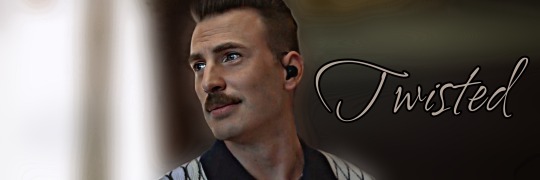
Twisted Pairing: Step Dad!Lloyd Hansen x Step Daughter!Reader
Word Count: 600+
Warnings: stepcest, voyeurism, female masturbation, nudity, implied future anal, minor daddy kink, dubcon/noncon if you squint, reader is early twenties, age gap.
Request: Lloyd Hansen, Step Dad, “What’s the matter? You’re acting like you’ve never seen a naked man before.”, and anal. Requested by: anonymous
A/N: I'm sorry I've been so slow with writing these. January has proven to be much more difficult than I had anticipated. I promise the stories are coming, and I am looking forward to doing your requests. This isn't my best work, but I still had fun writing it. It has not been beta read, so any mistakes are my own. As always my work is intended for adult audiences so 18+ only! Minors DNI. Pay attention to all tags and warnings. You are responsible for your own media consumption.
Writing Event Masterlist (still in the works)

From the first time Lloyd saw you he knew he needed to have you. That’s the thing about Lloyd Hansen, he always gets what he wants. He’d only married your mother because of the connections she provided. With her he’d be able to spread his business out throughout the country. What he hadn’t expected was the delicious present she had been hiding.
Tonight your mother was out with friends from college. Lloyd knew this was the perfect opportunity to get what he’d been craving. You. He could picture you up in your bedroom reading one of your countless books. It was cute how you always seemed to find ways to avoid him. Whether you wanted to admit it or not, he knew you felt something too. There was a magnetic pull between the two of you, and tonight would be the night he finally gets what he’s needed.
Lloyd makes his way up the stairs and stops outside your bedroom door. He’d expected to hear nothing, but instead he could hear what sounded like quiet whimpers. His eyes flutter shut as he leans in closer hoping to be able to hear you better. “Oh… Oh fuck, Lloyd.” There was no denying what he heard that time. You were in there touching what belonged to him. Without giving it a second thought, Lloyd quickly began to undress himself. This hadn’t been how he planned to do this, but when the opportunity presents itself how could he say no?
Once undressed, Lloyd opens your door. It takes you a moment to realize he’s standing there, and boy was he thankful for that. For that meant he was able to get a full spread eagle view of your soaked cunt. He watched as your finger meticulously rubbed your clit. The little moans that left your mouth were like music to his ears. It was when he let out a small grunt of approval that your eyes finally opened.
The look of embarrassment washed over your face. But that look quickly turned into confusion and horror when you spotted that he was naked. Your eyes traveled down to his hard cock which was now between his large hand. Lloyd’s smirk grew when he saw that your eyes appeared to be glued on him. “What’s the matter? You’re acting like you’ve never seen a naked man before.” His eyes never once leave yours as he slowly strides across your bedroom. “Oh come on, sunshine. We both know what you were just doing — who you were thinking about. Come on, be a good girl, show me.”
The more he talked, the more your body seemed to tremble from nerves. “I - I don’t know what you’re talking about, Lloyd.” He rolls his eyes at your attempt to play dumb. He wasn’t going to allow you to continue your charade of being so called innocent. “You really want to play that game? Fine, show me. Prove to me that you’re not soaked right now. Because you and I both know that your little pussy is dripping for me. Dripping for your step-daddy.” His words cause a small to leave your lips.
Maybe just this once you can give into your desires. Maybe just this once you can be bad.
Lloyd could hear a semblance of a plea when he watched you lay back on your bed. Your legs spread wide, inviting him to come give you both what you need. But Lloyd lets out a small tut and shakes his head. “Sorry, sunshine. That pussy isn’t what I’m interested in right now. I’d rather fuck your untouched hole. Turn around now.”
#vellicores writing event#lloyd hansen#step dad lloyd hansen#step dad!lloyd hansen#stepdad!lloyd hansen#lloyd hansen x reader#lloyd hansen x fem!reader#lloyd hansen ficlet#lloyd hansen fic#lloyd hansen drabble#chris evans#the gray man
431 notes
·
View notes
Text
"Guess the intended narrative!" (Yoda & Anakin edition)
Okay, so real quick! Let's play a game 😃!
Here are some George Lucas quotes, for context!




Read them? Great 💪
POP QUIZ:
In this scene:

HOW DOES THE NARRATIVE FRAME YODA'S ADVICE?
Answer #1: "Yoda's advice is on point."
The narrative sides with Yoda, who - with what little context he has - gives Anakin objectively wise advice which Anakin just isn't in the right headspace to heed (and doing so, Yoda thus delivers George's message that the cycle of life and death is inevitable and you must cherish what you have and learn to let go, because nothing lasts forever and change is inevitable).
Answer #2: "Yoda’s advice is cold and useless."
"Yoda’s reply is useless for a terrified husband and father-to-be. [...] Anakin hears this cold advice in misery." - Jason Fry, Star Wars Insider #130, 2012 "A Jedi with that much empathy [Anakin] is also a threat to Yoda’s school of thought, even if they don’t completely turn to the dark side. Because empathy makes you worry about everything. And after seeing things the same way for centuries, Yoda doesn't want to be questioned like that! He is very good at the philosophical theory of compassion, but he is bad at its practical application on human beings. Like many people in the real world who talk a lot about decency or morality, without ever applying anything." - Karen Traviss, Lucasfilm Magazine #74, 2008
I know which answer I'd put my money on: the less convoluted one.
Y'know, like the one you'd find in a kids' movie.
Note: a scene can have multiple interpretations, yes.
But there is a big difference between headcanon and narrative intent. You, as an audience member, might see Yoda as cold... that doesn't mean the story itself agrees with you, and that we're meant to see him as cold.
And for Answer #2 to be correct, we would have to assume that the same guy who stated the above-listed four quotes would decide to frame the mouthpiece character presenting those very philosophies as cold and callous. In a movie for kids. Make it make sense.
#yes I already made this post a while ago but I was bored and I thought I would redo it again with better graphic design#yoda#george lucas#jedi order#star wars#collection of quotes#in defense of the jedi#pro jedi#meta#sw meta
155 notes
·
View notes